 17/12/2009 04:06 17/12/2009 04:06 |
|
| | | OFFLINE | | Post: 19.096
Post: 1.741 | Registrato il: 28/08/2005
Registrato il: 20/01/2009 | Administratore | Utente Veteran | |
|

 Other stories posted 12/16/09 in the preceding page, including photos of the General Audience
Other stories posted 12/16/09 in the preceding page, including photos of the General Audience
and the full text of the Pope's catechesis in English translation.
 Bertone says the Pope is a good listener,
Bertone says the Pope is a good listener,
discusses Benedict XVI's priorities

PARIS, DEC. 16, 2009 (Zenit.org).- Benedict XVI is a "man who listens," and who habitually works in a "collegial manner," affirmed Cardinal Tarcisio Bertone, who is the Holy Father's secretary of state, and his closest collaborator.

Cardinal Bertone spoke of his own role in the Vatican and the priorities of Benedict XVI's pontificate in an exclusive interview given Monday with the Catholic French television station KTO, on the occasion of the station's 10th anniversary.
In the interview conducted by Philippine de Saint-Pierre, the cardinal described Benedict XVI as a "man who listens," and said the Pope does all he can to "take the pulse of the Church."
He refuted comments made by Vatican observers that the Pope is too isolated, noting that the Holy Father meets regularly with all the heads of all the Vatican dicastries, and during his meetings with bishops making their ad limina visits, he "gives them all the time he can."
In describing the Pope's "style," the cardinal said that he is "the first who loves: The first who loves the Church, who loves the faithful of the universal Church. The first who serves the Church, who gives his life to the Church, day and night, through his work, through his prayer."
"He is also the first who builds unity in the Church," he added.
During the long interview, Cardinal Bertone talked of the "special relationship" Benedict XVI has with the Second Vatican Council, calling him "a great Pope of Vatican II".
"It suffices to see the number of times he cites texts of the Council in his discourses, addresses, his encyclicals."
"He is one of finest connoisseurs of the Council," the cardinal added.
The Salesian cardinal noted that in the wake of Vatican II, where then Cardinal Joseph Ratzinger was an expert and enjoyed a certain "celebrity," he "saw certain abuses, certain dangers, and he has emphasized above all the interpretation of the Council in terms of continuity, and not in terms of rupture, with Tradition."
"This is an essential point," Cardinal Bertone said, who also discussed the Pope's decision to lift the excommunication of four bishops of the St. Pius X Society earlier this year.
The cardinal noted that Benedict XVI is very much aware of what is at stake with the situation of the St. Pius X Society: "One must remember that in 1998, he maintained the relationship and conducted the dialogue with Archbishop Lefebvre and his team, at the request of John Paul II."
Cardinal Bertone explained one reason why Benedict XVI is reaching out to the traditionally minded society is because "Tradition is part of the Church, it's a patrimony that we should know and value, and not simply leave to one side or in the library."
Another reason, he continued, has to do with one of the Pope's "fundamental concerns," which is unity.
In the interview, Cardinal Bertone addressed other important challenges facing the pontificate of Benedict XVI, such as ecumenical dialogue, in particular with the Orthodox Churches, as well as relations with Jews and with Islam.
Benedict XVI is a "figure very much esteemed as a great theologian" in these conversations, noted Cardinal Bertone.
[Modificato da TERESA BENEDETTA 17/12/2009 14:19] |
| |
|
| |
 17/12/2009 04:55 17/12/2009 04:55 |
|
| | | OFFLINE | | Post: 19.097
Post: 1.742 | Registrato il: 28/08/2005
Registrato il: 20/01/2009 | Administratore | Utente Veteran | |
|
 Crusading priest thanks Pope
Crusading priest thanks Pope
for stand on pedophilia,
offers to help Irish bishops

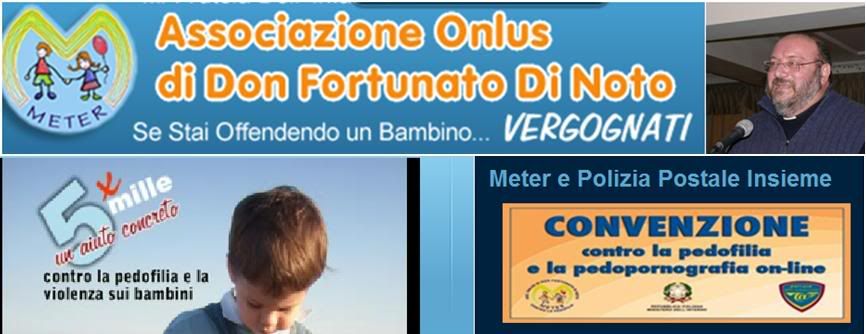 METER's online site is very informative and contains all kinds of links to facilitate reporting of any cases of offenses asgainst children and minors. The slogan below his banner says, "If you are offending a child, be ashamed!" (ONLUS is an Italian acronym for the term that means 'non-profit social organization'.
METER's online site is very informative and contains all kinds of links to facilitate reporting of any cases of offenses asgainst children and minors. The slogan below his banner says, "If you are offending a child, be ashamed!" (ONLUS is an Italian acronym for the term that means 'non-profit social organization'.
AVOLA, Italy, DEC. 16, 2009 (Zenit.org).- Father Fortunato Di Noto, founder of the Meter Association that helped U.S. and Italian authorities uncover 100 online pedophile communities earlier this year, is thanking Benedict XVI for his strong stand against pedophilia.
The Pope met last week with Cardinal Sean Brady, president of the Irish episcopal conference, and Archbishop Diarmuid Martin of Dublin, to discuss the Murphy Commission Report, which details abuse cases in the Dublin Archdiocese from 1975 to 2004.
A Vatican communiqué reported that the Holy Father expressed his "outrage, betrayal and shame" over the scandal of abuse by clergy.
Father Di Noto praised the Holy Father's reaction, and affirmed that his organization is "available to help the Irish bishops."
"All sexual abuse of children is tragic -- it is an enormous sin," he said. In the case of a priest-perpetrators, Father Di Noto said, "It should never have happened."
"To the Pope -- to this Pope -- who is doing so much to fight against pedophilia in the clergy and to defend children, I say: We are with you. Go forth with strength for the little ones."
Father Di Noto, a native of Sicily, has worked over the last 15 years to secure 1,064 charges against pedophiles and worked some 780 cases.
"Meter," he noted, "has undertaken important International investigations and has given hope to many children."
[Modificato da TERESA BENEDETTA 17/12/2009 04:57] |
| |
 17/12/2009 11:45 17/12/2009 11:45 |
|
| | | OFFLINE | | Post: 19.098
Post: 1.744 | Registrato il: 28/08/2005
Registrato il: 20/01/2009 | Administratore | Utente Veteran | |
|
  Introd confers honorary citizenship
Introd confers honorary citizenship
on their summer visitor, the Pope
Translated from
the 12/17 issue of

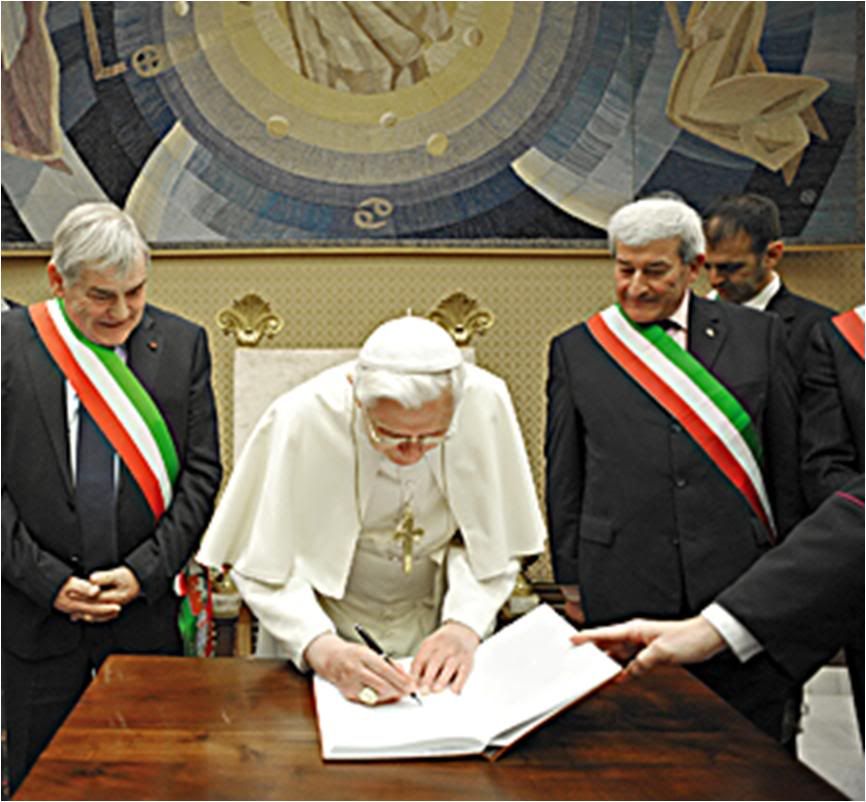
Benedict XVI has received honorary citizenship in the Commune of Introd, where Les Combes is located, the village in Val D'Aosta, northwest Italy, where he has spent three summer vacations as Pope.
The ceremony took place Wednesday in a salon of the Aula Paolo VI after the General Audience.
Present were the representatives of the region (Val D'Aosta), the mountain area called Gran Paradis which includes Introd, and the commune itself, along with its parish priest, don Ferruccio Brunod.
Addressing the Holy Father, the president of the region, Augustin Rollandin, said that "the truest and most profound meaning of this symbolic gesture is that it represents the affection and devotion" of the local population.
The presence of the Pope, he said, "has become for us a precious appointment" which has "brought Christian teaching much closer to our people". He said the honorary citizenship was "the dutiful acknowledgment of the most important visitor to our valley".
The mayor of Introd, Osvaldo Naudin, after having invited the Pontiff to return to Val D'Aosta, read the parchment with the official decree of conferment which was decided unanimously by the communal council last July 28.
Naudin expressed to Benedict XVI "the gratitude of a small but prideful mountain community. The presence of the Successor of Peter in Les Combes, a place that loves him as it did his predecessor, the unforgettable John Paul II, honors and gives luster to the Commune of Introd".
The Holy Father replied with these remarks:
Mr. President of the Region,
Mr. Mayor,
Reverend Parish Priest,
Ladies and gentlemen:
It is with great joy that I receive this honorary citizenship from the Commune of Introd, where I have spent unforgettable days of rest surrounded by the splendid Alpine panorama which favors an encounter with the Creator and recharges the spirit.
In addressing each of you with a heartfelt greeting, I wish to thank in particular the president of the Autonomous Region of Val D'Aosta, Augusts Rollandin, and the Mayor of Introd, Osvaldo Naudin, for the courteous words they have spoken in the name of those present and the people they represent.
I consider the decision of the communal council of Introd, who have now counted me among the honorary citizens of their community, as a sign of affection from all the Introleins and other inhabitants of the entire Val D'Aosta who have always given me a warm and cordial welcome, that is at the same time, discreet and respectful of my rest and quiet.
Now I can more rightfully say that I am truly at home in Introd, this delightful Alpine locality to which I am linked by grateful memories and a feeling of special spiritual closeness.
At this moment, so many memories come back to me, above all, the chalet in the middle of the woods: a place of spiritual repose with a splendid panorama, and a sign of the affection of the people, the mayor, and all of you.
So many things I could recount. For now, we have talked of what happens with the chalet in winter, and I am happy to know that it is well cared for and protected.
I am happy to learn from the words of Mr. Mayor that my presence in Val d'Aosta - and before me, that of my beloved predecessor John Paul II - has promoted the growth of faith in that population who are so dear to me, who are so rich in Christian traditions and so many signs of religious vitality.
I also know that in that age-old spiritual patrimony, the Church in Val D'Aosta, under the diligent leadership of its pastor, my dear Mons. Giuseppe Anfossi, has been tireless in announcing the ever fresh 'good news' of Jesus, Word of God, who became man to offer us the joy of living - already on this earth - the exalting experience of being beloved children of God.
This task appears particularly urgent in a society that nourishes, especially in the new generations, illusions and false hopes, but whom the Lord calls upon even today to transform itself into the 'family' of the children of God. who live with 'one heart and one spirit' (Acts 4,12) bearing witness to love of life and love of each other.
Dear friends, in renewing to you my expressions of affection and gratitude, I invoke on you, your families and the entire Val d'Aosta the blessing of God.
May the Lord continue to protect your communities and help you to build a future that, in placing God before everything else, will be ever more just, fraternal and full of hope.
Other events after yesterday's General Audience:
 With the inter-religious committee of Kuwait
With the inter-religious committee of Kuwait
Freedom of worship, proposals for laws to protect religions, and the search for a common cultural formation are the objectives of a Muslim-Christian committee for inter-religious dialog in Kuwait, that were explained to the Pope after the general audience Wwednesday in Aula Paolo VI.
The secretary of the committee, Zuhair Al-Mahmeed, a Shiite Muslim, presented the Pope with a finely bound volume in Arabic containing the proceedings of a forum on Jesus promoted in 2007 by the Islamic Institute Consensus Movement.
Mons, Camillo Bellin, Apostolic Vicar in Kuwait, called it "a sign of dialog and respect".
Also present was evangelical pastor Amanuil Ghareeb, vice president of the committee, which includes Sunni Muslims, Coptic and Orthodox Christians as well as Catholics.
An encyclopedia of bioethics
The first copy of the first volume of the Enciclopedia di bioetica e scienza giuridica was presented to the Holy Father by Mons. Elio Sgreccia, editor of the bioethics content, and Antonio Tarantino, professor at the Unviersity of lecce, who edited the juridical part.
The encyclopedia will comprise 12 volumes, which will be issued every month in teh next year.
"Today, bioethical questions," Mons. Sgreccia said, "have entered Parliaments which legislate on life and death, on families and chilren. The encyclopedia is an instrument that puts together ethical, anthropological and juridical aspects of these issues."
25 years of Fraternita
A thousand-person delegation "composed of families who have welcomed more than 600 minors as foster children into their families" came to celebrate with the Pope the 25th anniversayr of the association Fraternita, under their president, Mons. Mauro Inzoli,
"Inspired by the educational and charitable charisms of don Giussani [late founder of Comunione e Liberazione who was firned of Joseph Ratzinger], our focus has been on the family, seeking above all to love each of these children one by one, totally and unconditionally".
Accompanying the pilgrims was Cardinal Ennio Antonelli, president of the Pontifical Council for the Family.
Other guests received yesterday
The Holy Father also met with
- Rumiana Jeleva, Foreign Minister of Bulgaria who later met with Archbishop Dominique Mamberti, Vatican secretary for relations with states.
- US astronauts Scott Altman and Massimo Massimino, who have flown the Space Shuttle, and their families
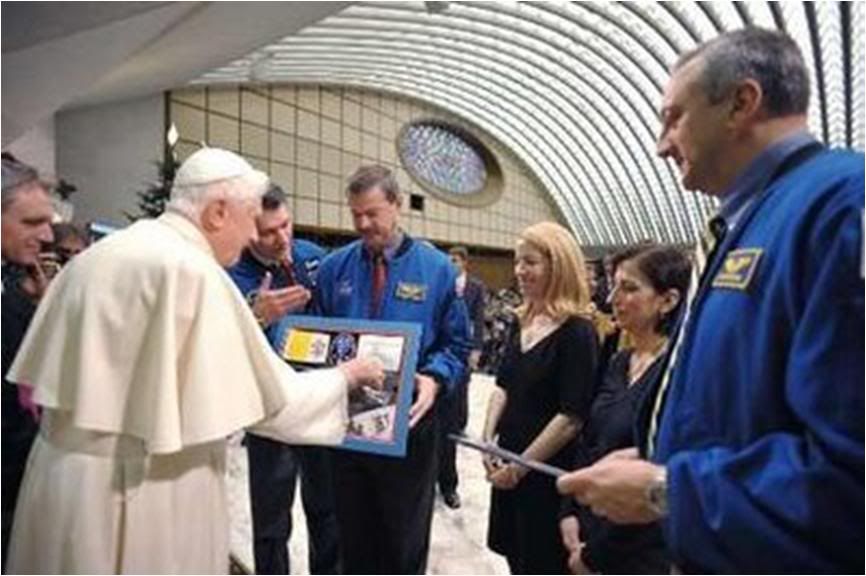
- Dino Meneghin, president of the Basketball Fderation and a former basketball star himself, who presented the Pope with a ball and a T-shirt of the italian national team personalized with the Pope's name.
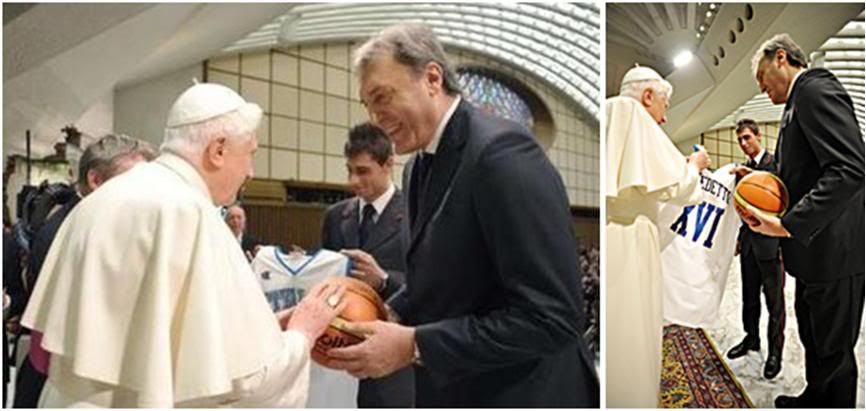
Before leaving the audience hall, the Pope blessed this year's Christmas creche which is a gift from the State of Mexico, and thanked its governor, Enrique Pena Nieto, and the promoters of the initiative.
[Modificato da TERESA BENEDETTA 17/12/2009 12:30] |
| |
 17/12/2009 13:45 17/12/2009 13:45 |
|
| | | OFFLINE | | Post: 19.099
Post: 1.745 | Registrato il: 28/08/2005
Registrato il: 20/01/2009 | Administratore | Utente Veteran | |
|
 Thursday, December 17
Thursday, December 17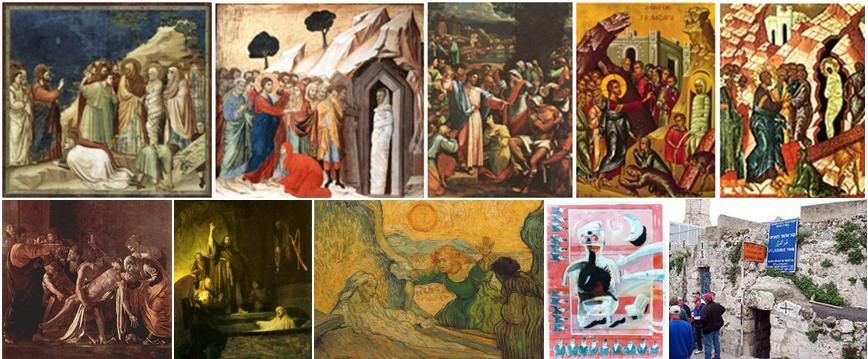 The raising of Lazarus from heh dead has been a popular subject for painters through the ages, Top panel, from left - Giotto, 1304; Duccio, 1319, Sebastiano del Piombo, 1517; a Greek icon; a Russian icon.
The raising of Lazarus from heh dead has been a popular subject for painters through the ages, Top panel, from left - Giotto, 1304; Duccio, 1319, Sebastiano del Piombo, 1517; a Greek icon; a Russian icon.
Bottom panel, from left - Caravaggio, 1609; Rembrandt, 1630; Van Gogh, 1898; Ian Pollock, 2000; and the tomb of Lazarus.
ST. LAZARUS OF BETHANY, Friend of Jesus, Brother of Martha and Mary
The Jews said of him, "See how much he loved him", after Jesus raised him back to life in their sight. Legends abound of what happened to Lazarus after the death and resurrection of Christ. most claiming that he and his sisers ended up in Europe (Cyprus or Gaul) where he served as bishop until he died. Today, the 'tomb of Lazarus'
(extreme right photo, bottom panel) continues to be a pilgrimage place on the West Bank on the site of the historical Bethany.
OR today.
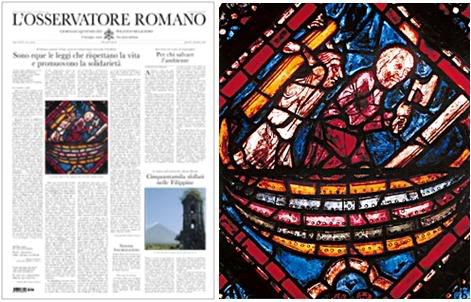 Illustration: 'Boah building the ARk', Stained-glass panel, Chartres Cathedral.
Illustration: 'Boah building the ARk', Stained-glass panel, Chartres Cathedral.
At the General Audience, the Pope on the English medieval theologian
John of Salisbury:
'Equitable laws are those that respect life and promote solidarity'
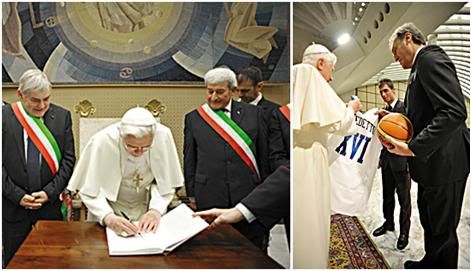 Other Page 1 stories: An editorial 'Who are we saving the environment for?' commenting
Other Page 1 stories: An editorial 'Who are we saving the environment for?' commenting
on the ecocentrism of the Copenhagen conference on climate change; and 50,000
evacuated from the vicinity of Mayon Volcano in the Philippines feared to erupt soon.
Sidebars on post-audience events yesterday (bottom photos) in the inside pages.
THE POPE'S DAY
At 7:30 a.m., the Holy Father celebrated Mass at the Redemptoris Mater Chapel to mark the 90th birthday
of Cardinal Thomas Spidlik, S.J. Homily in Italian.
Later he met with
- New ambasaadorS from Denmark, Uganda, Sudan, Kenya, Kazakhstan, Bangladesh, Finland, and Latvia,
who presented their credentials. Address in various languages to each of them, and an address
to all of them in French.
- Bishops of Belarus (Byelorussia) on ad limina visit (Group 2), then all of them together.
Address in Byelorussian.
And at 5:00 p.m.
- Vespers and meeting with the university students of Rome - Traditional pre-Christmas encounter
at St. Peter's Basilica.
The Vatican also announced that
- the Holy Father has accepted the resignation of the Bishop of Limerick, Donal Brendan Murray,
one of those named in the recent Irish government report to have covered up incidents of child abuse
by priests.
- the Holy Father has taken away the clerical status of former Archbishop of Lusaka, Emmanuel Milingo.
Full statement posted below.
[Modificato da TERESA BENEDETTA 18/12/2009 14:25] |
| |
 17/12/2009 15:22 17/12/2009 15:22 |
|
| | | OFFLINE | | Post: 19.100
Post: 1.746 | Registrato il: 28/08/2005
Registrato il: 20/01/2009 | Administratore | Utente Veteran | |
|
 Pope dismisses Milingo
Pope dismisses Milingo
from the priesthood

The Holy Father, Benedict XVI, has dismissed former Archbishop Emmanuel Milingo of Lusaka from the clereical state, in accordance with the relevant provision of Canon Law, the Vatican announced today in the following statement:
For a number of years the Church has followed with great concern the difficulties caused by the regrettable conduct of Archbishop Emmanuel Milingo.
Many attempts have been made to bring Archbishop Milingo back into communion with the Catholic Church, including the consideration of suitable ways to enable him to exercise the episcopal ministry.
Pope John Paul II and Pope Benedict XVI were directly involved in those efforts and both Popes personally followed the case of Archbishop Milingo in a spirit of paternal solicitude.
In the course of this unhappy series of events, Archbishop Milingo became irregular in 2001 as a result of his attempt to marry Mrs. Maria Sung, and incurred the medicinal penalty of suspension (cf. Canons 1044 § 1, n. 3; 1394 § 1 of the Code of Canon Law).
Thereafter, he headed certain groups calling for the abolition of clerical celibacy and gave numerous interviews to the media in open disobedience to the repeated interventions of the Holy See, creating serious upset and scandal among the faithful.
Then, on 24 September 2006 in Washington, Archbishop Milingo ordained four Bishops without pontifical mandate.
By so doing, he incurred the penalty of excommunication latae sententiae (Canon 1382) which was declared by the Holy See on 26 September 2006 and is still in force today.
Sadly, Archbishop Milingo has shown no sign of the desired repentance with a view to returning to full communion with the Supreme Pontiff and the other members of the College of Bishops.
Rather, he has persisted in the unlawful exercise of acts belonging to the episcopal office, committing new crimes against the unity of Holy Church. Specifically, in recent months Archbishop Milingo has proceeded to several other episcopal ordinations.
The commission of these grave crimes, which has recently been established, is to be considered as proof of the persistent contumacy of Archbishop Emmanuel Milingo. The Holy See has therefore been obliged to impose upon him the further penalty of dismissal from the clerical state.
According to Canon 292 of the Code of Canon Law, the penalty of dismissal from the clerical state, now added to the grave penalty of excommunication, has the following effects:
- Loss of the rights and duties attached to the clerical state, except for the obligation of celibacy;
- Prohibition of the exercise of any ministry, except as provided for by Canon 976 of the Code of Canon Law in those cases involving danger of death;
- Loss of all offices and functions and of all delegated power, as well
- Prohibition of the use of clerical attire.
Consequently, the participation of the faithful in any future celebrations organized by Archbishop Emmanuel Milingo is to be considered unlawful.
It must be pointed out that the dismissal of a Bishop from the clerical state is most extraordinary. The Holy See has felt obliged to act in this way due to the serious consequences for ecclesial communion resulting from repeated episcopal consecrations carried out without pontifical mandate; nevertheless, the Church hopes that Archbishop Milingo will see the error of his ways.
As for those recently ordained by Archbishop Milingo, the Church’s discipline in imposing the penalty of excommunication latae sententiae upon those who receive episcopal consecration without pontifical mandate is well-known.
While expressing hope for their conversion, the Church reaffirms what was declared on 26 September 2006, namely that she does not recognize these ordinations, nor does she intend to recognize them, or any subsequent ordinations based on them, in the future. Hence the canonical status of the supposed bishops remains as it was prior to the ordination conferred by Archbishop Milingo.
At this moment, as the Church experiences profound sorrow for the grave acts perpetrated by Archbishop Milingo, she entrusts to the power of prayer the repentance of the guilty party and of all those who - be they priests or lay faithful - have in any way cooperated with him by acting against the unity of Christ’s Church.
To say that this courageous Pope never ceases to surprise is an understatement. Expect a flood of commentary.....
[Modificato da TERESA BENEDETTA 17/12/2009 15:25] |
| |
 17/12/2009 15:36 17/12/2009 15:36 |
|
| | | OFFLINE | | Post: 19.101
Post: 1.747 | Registrato il: 28/08/2005
Registrato il: 20/01/2009 | Administratore | Utente Veteran | |
|


 Pope accepts resignation of
Pope accepts resignation of
the Bishop of Limerick
by PADDY AGNEW in Rome

Dec. 17, 2009
The Vatican confirmed this morning that Pope Benedict XVI has accepted the resignation of the Bishop of Limerick Donal Murray.
Bishop Murray is one of a number of auxiliary bishops criticised in the Murphy commission report into the handling of allegations of child sexual abuse in the Dublin archdiocese from 1975 to 2004.
In a brief statement, the Vatican confirmed: “The Holy Father has accepted the resignation from the pastoral governance of the diocese of Limerick, presented by Monsignor Donal Brendan Murray, in conformity with article 401,2 of Code of Canon Law."
Article 401.2 of Canon Law, as promulgated by Pope John Paul II in 1984, reads: “A diocesan bishop who has become less able to fulfill his office because of ill health or some other grave cause is earnestly required to present his resignation from office”.
Asked about the “other grave cause” which prompted Bishop Murray’s resignation, senior Vatican spokesman Father Federico Lombardi told The Irish Times : “That seems to me obvious, given the situation that had been created by the publication of the (Murphy) Report and given that he was one of the people involved in the events dealt with by the report. For that reason and for the good of the church, for a greater serenity, he spontaneously presented his resignation.”
Asked if Bishop Murray had met with the Pope whilst in Rome last week, Father Lombardi said: “I don’t believe he did, I have no information in regard to that, as far as I know the normal procedure was followed and that would mean that Bishop Murray discussed his situation with Cardinal Re at the Congregation of Bishops. Then the Cardinal will have informed the Holy Father.
Fr Lombardi acknowledged that the resignation had been expected by the Holy See, saying: “This was not a surprise, he was in Rome a number of days ago, and he presented his resignation off his own initiative and his own will. The diocese now remains vacant and a diocesan administrator will now be elected until such time as a successor, a new Bishop is appointed, all in line with normal practice.”
Asked if the resignation of Bishop Murray might be merely the first of several resignations by those mentioned in the Murphy report, Fr Lombardi said: “I have no idea and I have nothing to say about that."
In an address to churchgoers at Mass at St John's Cathedral in Limerick this morning, Bishop Murray said he "humbly" apologised to those who were abused as children. He had heard the views of many survivors, especially in the days following the publication of the Murphy report.
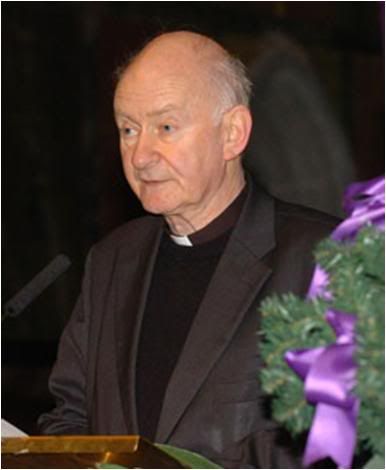
"Some expressed the wish that I should resign; others asked me not to do so. I know full well that my resignation cannot undo the pain that survivors of abuse have suffered in the past and continue to suffer each day. I humbly apologise once again to all who were abused as little children. To all survivors of abuse I repeat that my primary concern is to assist in every way that I can, on their journey towards finding closure and serenity."
The bishop said he had asked the Pope to allow him resign and to appoint a new bishop to the diocese because "I believe that my presence will create difficulties for some of the survivors who must have first place in our thoughts and prayers."
The other bishops named by the official report as taking part in covering up the sex offenses against children and minos by their priests should follow Mons. Murray's lead, if only to give the Church of Ireland a real chance to start a new page.
One can only pray that all the parties guilty one way or the other in this sordid story will spend the rest of their days doing penance appropriately for their misdeeds, preferably in some sort of ongoing apostolic work for the victims and their families.
Pope accepts Irsh bishop's reignation
in the wake of the child abuse report
by Frances D'Emilio

VATICAN CITY, Dec. 17 (AP) – Pope Benedict XVI has accepted the resignation of Limerick's bishop, who was heavily criticized in an Irish investigation of clergy sex abuse of children and a church hierarchy cover-up, the Vatican said Thursday.
The one-line announcement that Monsignor Donal Murray had resigned did not mention the scandal.
It said, however, that Murray resigned under a Canon Law provision that allows bishops, younger than the mandatory retirement age of 75, to step down when they become "unsuited" to continue in the post.
Unsuitability can result from illness, or some other circumstance, such as scandal.
Murray, 69, a former assistant bishop in Dublin, had been widely expected to resign, following a devastating report issued last month that alleged that the Church in Ireland shielded more than 100 child-abusing priests from the law.
The Irish government-sanctioned investigation found four other serving bishops and five retired bishops, including Cardinal Desmond Connell, as playing a role in the scandal cover-up lasting for decades.
The report said that Church leaders in the Dublin Archdiocese failed to inform authorities about sexual abuse by priests, while police failed to pursue allegations under the belief that
Church figures were above the law. [This second element is hardly ever mentioned in the news reports so far about the scandal.]
Two bishops, Martin Drennan of Galway and Eamonn Walsh of Dublin, have said they have no intention of tendering their resignation to the Pope. [Why won't they, if they are named as part of the cover-ups in the report, and what will the Vatican do then, in their case?]
The Vatican has been harshly criticized in Ireland, a nation of staunch Catholic traditions, for failing to answer letters from the Dublin Archdiocese investigators.
But earlier this month, the Vatican described Benedict as being "deeply disturbed" by the sex-abuse scandal and said he will write a letter to Catholics in Ireland with the Holy See's response. It said also the pope shares the "outrage, betrayal and shame" felt by many Irish faithful.
Benedict met at the Vatican this month with senior Irish clergy to discuss a possible response.
The 720-page report found that dozens of church leaders in Ireland's most populous diocese kept secret the record of child abuse by more than 170 clerics since 1940.
Police and social workers charged with stopping child abuse didn't start getting cooperation from the Church until 1995. This opened the floodgates to thousands of abuse complaints expected to cost the Dublin Archdiocese millions of euros.
Irish bishop resigns
over child sex abuse

VATICAN CITY (AFP) – Pope Benedict XVI on Thursday accepted the resignation of an Irish bishop, Donal Murray, over Ireland's child sex abuse scandal, the Vatican announced.
Murray, the bishop of Limerick, was named in a report last month that concluded that top prelates concealed clerical abuse and failed to inform police of offences over a period of more than three decades.
Other senior church officials, including four archbishops cited in the report, face growing pressure to resign.
One priest admitted to sexually abusing over 100 children, while another confessed that he had abused children on a fortnightly basis over 25 years.
The pope met at his request last week with Ireland's two most senior Roman Catholic churchmen, primate of all-Ireland Cardinal Sean Brady and Dublin Archbishop Diarmuid Martin.
Vatican spokesman Federico Lombardi said the participants did not discuss whether any of those implicated in the scandal should resign.
But Martin told reporters afterward: "We will need a very significant reorganisation of the Church in Ireland."
The Pope apologised for the abuse, saying he "shares the outrage, betrayal and shame felt by so many of the faithful in Ireland (over) these heinous crimes".
The Vatican statement last Friday said the Church "will continue to follow this grave matter with the closest attention in order to understand better how these shameful events came to pass and how best to develop effective and secure strategies to prevent any recurrence."
[Modificato da TERESA BENEDETTA 17/12/2009 17:26] |
| |
 17/12/2009 17:25 17/12/2009 17:25 |
|
| | | OFFLINE | | Post: 19.103
Post: 1.749 | Registrato il: 28/08/2005
Registrato il: 20/01/2009 | Administratore | Utente Veteran | |
|
 The Pope reminds us
The Pope reminds us
that sin is the absence of love:
An antidote to contemporary moralism
Translated from

December 17, 2009
There was a time when the idea of sin would have made people smile as at some vestige of the past. But it's different today.
In the era of private permissiveness which is transformed in public into a witch hunt avid for trials - institutional, popular or mediatic - we realize that the idea of evil is a serious matter.
Even the newspapers took note of the words pronounced by Benedict XVI in his annual discourse on the Feast of the Immaculate Conception, in which the Pope used a passage from St. Paul as his theme: "Where sin increased, grace overflowed all the more (Rom 5.20).
In the Christian concept of sin, evil is not simply the transgression of a rule, but it must be understood in terms of man's relationship to God - it is the absence of love on the part of man.
Contemporary moralism - which has a purely horizontal perspective - has reduced evil to transgression of principles, making respect for rules its ultimate criterion for distinguishing good from bacd.
But for the Christian, sin is not judged by a tribulnal, more or less public, but by God who loves the sinner and is quick to grant him redemption.
This is what gives Papa Ratzinger the strength to look at problems squarely without fear, as he has again shown in recent days regarding the involvement of some Irish priests and bishops in Ireland's child abuse scandals.
To call evil sin is the way Benedict XVI indicates in order to emerge from dissatisfaction with a moralism that is restricted to punishments and condemnation.
To understand sin as an absence or deficiency of love means to be aware of that which can truly heal it.
|
| |
 17/12/2009 18:43 17/12/2009 18:43 |
|
| | | OFFLINE | | Post: 19.104
Post: 1.750 | Registrato il: 28/08/2005
Registrato il: 20/01/2009 | Administratore | Utente Veteran | |
|


 It is quite fitting that L'Osservatore Romano came out today with this front-page editorial by its 'resident economist', who is now also the president of the Vatican internal bank IOR.
It is quite fitting that L'Osservatore Romano came out today with this front-page editorial by its 'resident economist', who is now also the president of the Vatican internal bank IOR.
Gotti Tedeschi gives an incisive critique of the fashionably ecocentric and effectively anti-human orientation of all the bleeding hearts gathered in Copenhagen, whose decisions and actions are guided by nihilist ideology, and therefore willfully insensitive to objective reality, and ultimately, counter-productive to the pragmatic common good, for all their breast-beating sanctimony.
It is also a necessary antidote to the liberal MSM who have unthinkingly interpreted the Pope's message for the World Day of Peace as an endorsement of the 'Copenhagen consciousness' when it is anything but!
The uncertainties in Copenhagen:
Who are we saving the environment for?
by Ettore Gotti Tedeschi
Translated from the
12/17/09 issue of

The environment and global climate are subjects that deserve less banal considerations than those that are being disseminated these days, even by scologists.
Nihilist thinking, with its rejection of every objective value and truth, causes the most serious damage when applied to economics. Just think of the disastrous consequences of the Malthusian prejudice according to which it is population growth that causes poverty.
One can also think of the bad results produced by utilitarian doctrines which, by getting rid of ethical values in the economy, have generated the collapse of the economic structure itself.
Think further of the so-called moral autonomy of economics, which, in promoting relativism, has arrived at the criterion that only something tangible can be a value, thus spreading an excessively consumeristic and materialistic attitude.
But nihilist thinking is producing even much graver damages regarding the environment. First, it sought to convince man that he is only an intelligent animal, but that he has the possibility to do everything without any rules, pushing selfishness to the maximum in the exclusive quest for power.
Then it tried to extinguish the belief that human life has a sense that itself gives sense to man's actions.
And now it would presume to resolve global climate problems - about which great confusion reigns - through denatalization [less children] and de-industrialization, rather than through the promotion of values that restore the individual to his original dignity.
The conference on climate change in Copenhagen is confirming this course, provoking more opposition than solutions.
Opposition not only between demonstrators and the police, but between rich nations and poor nations, between scientists and politicians, between different power blocs.
It is thus not only ever more difficult to imagine a solution but even to understand what the real problem is.
In fact, there is no strategic vision of the problem, precisely because of the widespread nihilism that has come to theorize the absence of value in human life compared to the presumed centrality of 'nature' - the ecocentrism denounced by Benedict XVI - which man is only capable of damaging.
But ignoring reality will not resolve environmental questions, just as it will not regulate the global economy.
Thus in Copenhagen, they are seeking vague agreements on noxious gas emissions, without regard to ethical premises and shared scientific considerations.
Nihilist thinking is in danger of transforming the globalization process - which is actually positive for poorer countries - into a disorder cauwsed by homo ecomomicus, who is responsible for all environmental evils and therefore a candidate for self-elimination.
Blaise Pascal wrote: "It is true that there are natural laws, but corrupt reasoning has corrupted everything".
It seems to have corrupted even the capacity to objectively evaluate the value of the global economy, of the technologized market, and of economic freedom.
These are just means. But in the hands of an intelligent but selfish animal, they can generate the effects of abuse, including damage to the environment.
It is well and good that environmentalists call for better and greater attention to nature. But they would do better to read Caritas in veritate.
Then they would understand why - and above all, for whom - the encironment should be respected.
Can't resist tossing in this little item about Copenhagen!
Blizzard dumps snow on Copenhagen
as leaders battle warming
By Christian Wienberg
 Dec. 17 (Bloomberg) -- World leaders flying into Copenhagen today to discuss a solution to global warming will first face freezing weather as a blizzard dumped 10 centimeters (4 inches) of snow on the Danish capital overnight.
Dec. 17 (Bloomberg) -- World leaders flying into Copenhagen today to discuss a solution to global warming will first face freezing weather as a blizzard dumped 10 centimeters (4 inches) of snow on the Danish capital overnight.
“Temperatures will stay low at least the next three days,” Henning Gisseloe, an official at Denmark’s Meteorological Institute, said today by telephone, forecasting more snow in coming days. “There’s a good chance of a white Christmas.”
Delegates from 193 countries have been in Copenhagen since Dec. 7 to discuss how to fund global greenhouse gas emission cuts. U.S. President Barack Obama will arrive before the summit is scheduled to end tomorrow.
Denmark has a maritime climate and milder winters than its Scandinavian neighbors. It hasn’t had a white Christmas for 14 years, under the DMI’s definition, and only had seven last century. Temperatures today fell as low as minus 4 Celsius (25 Fahrenheit).
DMI defines a white Christmas as 90 percent of the country being covered by at least 2 centimeters of snow on the afternoon of Dec. 24.
Denmark isn't the only place in th world where there are winter anomalies - snow in Australia even, where summer is about to start! Shouldn't global warming fanatics take these as signs from Providence to remind them to cast a more dispassionate objective eye on facts before insisting on an ideology that it now appears has relied too much on questionable, posssibly manipulated data? At least acknowledge that 'the science is not settled' on the issue, far from it - and therefore, to be less Draconian about measures to be instituted, even at great disequilibrating cost to everyone, rich and poor, that may ultimately prove to be misguided, wasteful expense!
[Modificato da TERESA BENEDETTA 17/12/2009 22:18] |
| |
 17/12/2009 20:45 17/12/2009 20:45 |
|
| | | OFFLINE | | Post: 19.105
Post: 1.751 | Registrato il: 28/08/2005
Registrato il: 20/01/2009 | Administratore | Utente Veteran | |
|

 So many addresses by the Holy Father today, many of them requiring translation, so let me start with his first discourse today, a homily at an unusual Mass for an unusual occasion.
So many addresses by the Holy Father today, many of them requiring translation, so let me start with his first discourse today, a homily at an unusual Mass for an unusual occasion.
Benedict XVI's homilies are the papal texts I most look forward to and find most admirable - and I nurture the hope that someone in the Benedict XVI Foundation is going back over Joseph Ratzinger's enormous literary output to see if they can put together a homily by him for each day of the liturgical year.
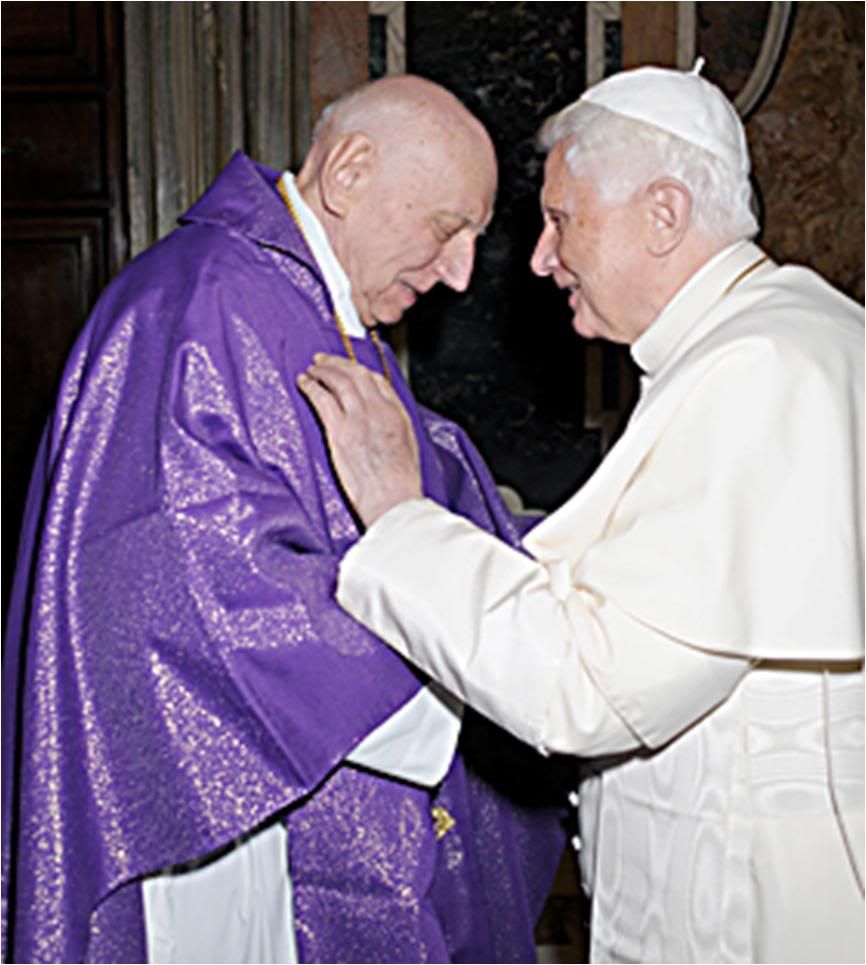 Pope says Mass for Cardinal Spidlik
Pope says Mass for Cardinal Spidlik
on his 90th birthday
Translated from

December 17, 2009
At 7:30 this morning, the Holy Father Benedict XVI presided at a Eucharistic Celebration with the community of the Centro Aletti in Rome in the Redemptoris Mater chapel of the Apostolic Palace, to mark the 90th birthday of Czech Cardinal Thomas Spidlik, S.J.
Here is a translation of the homily delivered by the Pope:
Dear friends,
With the liturgy today, we enter the last stage of the Advent journey, which calls us to intensify our preparation in order to celebrate the Nativity of the Lord with faith and joy, welcoming with intimate wonder God who has come to be with man, with each one of us.
The first reading presents us with the aged Jacob who calls together his sons to give them his blessing: it is an event of great intensity and emotion. This blessing is like a seal of faith on the covenant with God, but is also a prophetic vision that looks ahead and indicates a specific mission.
Jacob is the father who, through the not always linear paths of his personal story, has the joy of gathering his children around him and to trace the future of each of them and their descendancy.
In particular, today we heard the reference to the tribe of Judah, whose regal power is exalted, represented by the lion, as well as to the monarchy of David, represented by the scepter, staff of command, that alludes to the coming of the Messiah.
Thus what comes through in this double image, is the future mystery of the lion who becomes a lamb, the King whose staff of authority is the Cross, sign of true royalty.
Jacob had progressively become conscious of the primacy of God, he understood that his journey was led and sustained by the Lord's faithfulness, and he could only respond with full adherence to the covenant and design of God's salvation, becoming in turn, along with his own descendants, a link in the divine plan.
The Gospel passage from Matthew presents us with "the genealogy of Christ, son of David, son of Abraham" (Mt 1,1), underscoring and ultimately making explicit the faithfulness of God to his promise, which he is carrying out not only through men, but with them, and, as it was with Jacob, sometimes through tortuous and unforeseen ways.
The awaited Messiah, object of promise, is true God but also true man - Son of God, but also a child born of the Virgin, Mary of Nazareth, holy flesh descended from Abraham, in whose seed all the peoples of the earth would be blessed (cfr Gen 22,18).
In this genealogy, besides Mary, four other women are remembered - but not Sarah, Rebecca, Leah, or Rachel, the great women figures of Jewish history.
Paradoxically, they are four pagan women - Rahab, Ruth, Bathsheba, and Tamar - who seemingly 'spoil' the purity of the genealogy. But in these pagan women, who appear at decisive points in the history of salvation, the mystery of the church of the pagans emerges, the universality of salvation.
They are pagan women in whom the future appear, the universality of salvation. They are also sinners, and so, they also manifest the mystery of grace - it is not our works that redeem the world but the Lord who gives us true life.
They were sinners, yes, in whom appears the greatness of the grace that we are all in need of. These women nonetheless reveal exemplary responses to the faithfulness of God, by showing their faith in the God of Israel. That is how we see the church of the pagans emerge - mystery of grace, faith as gift and as a journey toward communion with God.
Thus the genealogy given by Matthew is not simply a list of generations: it is history as realized primarily by God but with mankind's response. It is a genealogy of grace and faith. The pursuit of the promise made by God to Israel rests on the absolute faithfulness of God to his promise, and on the solid faith of these women.
The blessing of Jacob comes happily on the 90th birthday today of our dear Cardinal Spidlik. His long life and singular journey of faith bear witness that God leads whoever entrusts himself to him.
But he has also followed a rich itinerary of thought, always communicating with ardor and profound conviction that the center of all Revelation is a Tri-Personal God, and that consequently, man who is created in his image is essentially a mystery of freedom and love realized in communion - which is the very way to' be of God'.
This communion does not exist by itself, but proceeds - as the Christian Orient does not tire of affirming - from the Divine Persons who love each other freely.
Freedom and love, constitutive elements of the person, cannot be grasped by means of rational categories - the person cannot be understood unless in terms of the mystery of Christ, true God and 'divine humanity' even in our own existence.
Faithful to this principle, Cardinal Spidlik has fashioned through the years a lively theological vision that is original in many aspects, in which the Christian East and West flow into each other organically, with a reciprocal exchange of their respective gifts.
His foundation is life in the Spirit; the principle of knowledge - love; study - an initiation into spiritual memory; concrete dialog with man - an indispensable criterion; and his context - the always living Body of Christ which is his Church.
Closely linked to this theological vision is the exercise of spiritual paternity, which Cardinal Spidlik has always carried out and continues to carry out.
Today, we can say that revolving around him in the celebration of the Divine Mysteries is his own 'small' spiritual descendancy, the Centro Aletti, which has accepted his precious teaching and made it fruitful through new institutions and new studies, and even through artistic representation.
In this context, I think it is particularly beautiful to underscore the link between theology and art in his thought. Indeed, it has been ten years since my venerated and beloved predecessor, the Servant of God John Paul II, dedicated this chapel, Redemptoris Mater, saying that "this work is offered as an expression of that theology with two lungs from which the Church of the Third Millennium may draw vitality".
He went on: "The image of the Redemptoris Mater - Mother of the Redeemer - which dominates the central wall places before our eyes the mystery of God's love who became man to give us, human beings, the capacity to become children of God... [It is] the message of salvation and joy that Christ, born of Mary, brought to mankind" (Insegnamenti XXII, 2 [1999], p. 895).
To you, dear Cardinal Spidlik, I wish from my heart the abundance of graces from the Lord, so you may continue to enlighten with your wisdom the members of the Centro Aletti and all your spiritual children.
Continuing with the celebration of the Holy Mysteries, I entrust each one to the maternal protection of the Mother of the Redeemer, invokingfrom the Divine Word who took on our flesh, the light and peace announced by the angels in Bethlehem. Amen.
Before the Pope's visit to thE Czech Republic last September, I posted two articles about Cardinal Spidlik in this thread and in the CZECH VISIT thread:
benedettoxviforum.freeforumzone.leonardo.it/discussione.aspx?idd=860...
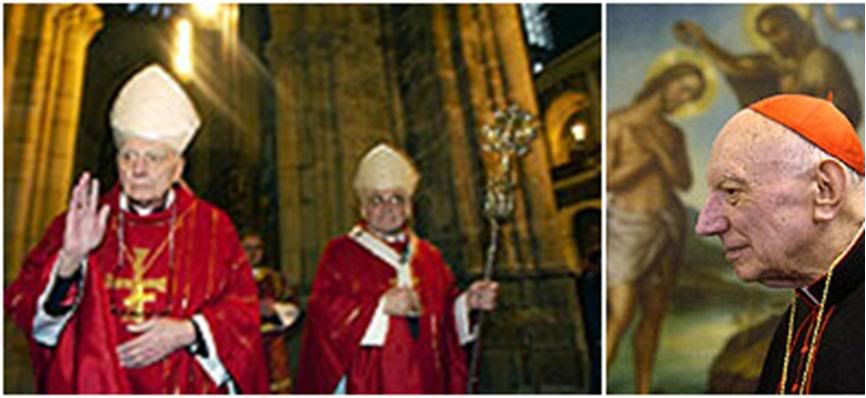 Above, left, recent photo of Cardinal Spidlik with Cardinal Vlk, Archbishop of Prague.
Above, left, recent photo of Cardinal Spidlik with Cardinal Vlk, Archbishop of Prague.
One of the outstanding personalities of the Church in the Czech Republic today is Cardinal Thomas Spidlik, botn in Brno 90 years ago. A Jesuit, he was forced to work in the quarries under both the Nazis and the Communists. He became a priest at age 30 despite difficulties of all kinds.
A world-famous theologian who became known for his books on tHE spirituality of thE Oriental Churches, he lives and works at the Centro Aletti in Rome with Fr. Marko Ivan Rupnik (artist of the mosaics in the Redemptoris Mater chapel and in the Padre Pio shrine in San Giovanni Rotondo).
For almost 50 years now, he has worked with Vatican Radio, dlivering a meditation every Friday. John Paul II MAde him a cardinal in 2003, when he was 83, uin recognition of his achievements as a theologian [like the late Avery Cardinal Dulles].
 More information about Cardinal Spidlik and his work can be found in:
www.sacredheart.edu/pages/24695_the_cardinal_spidlik_center_for_ecumenical_understan...
More information about Cardinal Spidlik and his work can be found in:
www.sacredheart.edu/pages/24695_the_cardinal_spidlik_center_for_ecumenical_understan...
[Modificato da TERESA BENEDETTA 17/12/2009 21:30] |
| |
 17/12/2009 23:58 17/12/2009 23:58 |
|
| | | OFFLINE | | Post: 19.106
Post: 1.752 | Registrato il: 28/08/2005
Registrato il: 20/01/2009 | Administratore | Utente Veteran | |
|
 The Pope to 8 new ambassadors:
The Pope to 8 new ambassadors:
Binding international agreements
to protect the environment,
and religions as a force
for peace and reconciliation
Translated from
the 12/18/09 issue of

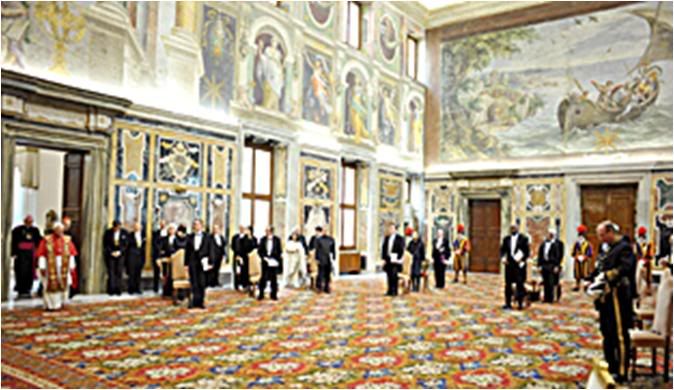
Receiving eight new ambassadors to the Holy See on Thursday, December 17, the Holy Father expressed the hope for binding international agreements to protect the environment, and said governments must recognize that religions can be a force for peace and reconciliation.
The Pope received the credentials of each of the new ambassadors in formal ceremonies at the Sala Clementina. Cardinal Tarcisio Bertone was also present.
The address that normally the Pope delivers to each ambassador was handed teach of them as documents. The Holy Father then delivered the following address in French to all of them, along with their families and staff members.
Messieurs Ambassadors:
I am happy to welcome you this morning to the Apostolic Palace. You came to present your Letters of Accreditation as ambassadors extraordinary and plenipotentiary of your respective nations: Denmark, Uganda, the Sudan, Kenya, Kazakhstan, Bangladesh, Finland and Latvia.
Welcome all, and please present my cordial greetings to your Chiefs of State and my thanks for the courteous words that you each had the goodness to convey on their behalf.
I express my fervent wishes for the high mission you are undertaking in the service of your respective countries. Likewise, I wish to greet through you the civilian and religious authorities in your countries, and your countrymen. Please assure them of my prayers.
My thoughts go naturally to the Catholic communities present in your countries. You know that they wish to join fraternally tin nation building to which they wich to contribute with all their possibilities.
In my last encyclical, Caritas in veritate, I evoked the necessary restoration of a correct relationship between man and the Creation in which he lives and works. Creation is the precious gift that God in his goodness gave man. They are its administrators and must therefore take on all the consequences of this responsibility.
Man can neither refuse nor escape such responsibility by passing it on to the coming generations. It is also evident that this environmental responsibility cannot be opposed to the urgency of putting an end to the scandals of poverty and hunger.
BOn the contrary, it is no longer possible to dissociate the two realities, because the continual degradation of the environment constitutes a direct threat to man's survival and his development. It also directly threatens peace among persons and peoples.
On the individual as well as the political level, it is necessary to make more decisive and more widely shared commitments with respect to Creation. In this sense, I strongly encourage the authorities of your respective countries, and the community of nations, not simply to strengthen their activities to protect the environment, but also - because the problem cannot be approached solely on the specific level of each nation - to provide forceful initiative and encouragement in order to reach binding international agreements that are both useful and just for everyone.
The challenges which mankind faces today certainly call for a mobilization of man's mind and creativity, an intensification of applied research for a more effective and healthy use of available energy and resources. These efforts cannot be carried out without a conversion or a transformation of the present development model for our societies.
The Church proposes that this profound change that has to be defined and carried out, should be oriented to the ideal of the integral development of the human being.
Indeed, the good of man does not reside in increasingly unbridled consumption and unlimited accumulation of assets - a consumption and accumulation that are restricted to very few but offered as a model for the masses.
In this respect, it does not fall only on the different religions to underscore and defend the primacy of man and his spirit, but also on the State. The latter has the duty to do so through an ambitious policy that favors access of all citizens, equally, to spiritual goods - those that value the richness of social relations and encourage man in his spiritual quest.
Last spring, during my apostolic visit to different countries of the Middle East, I proposed on many occasions to consider religions in general as a 'new start' for peace.
It is true that in history, religions have often been a factor for conflicts. But it is equally true that religions lived according to their profound sense have been and are a force for reconciliation adn peace.
In this historical moment, religions themselves, through sincere and frank dialog, should seek the way of purification in order to conform to their true vocation.
Mankind desires peace, and if possible, universal peace. One must work towards this without utopian visions and without manipulation. We all know that in order to be established, peace requires political, economic, cultural and spiritual conditions.
The peaceful coexistence of different religious traditions in each nation is sometimes difficult. More than just a political problem, this coexistence is also a problem that the religions must face within themselves. Every believer is called on to seek God's will with regard to every human situation.
In recognizing God as the only Creator of man - of all men, whatever their religion, social condition or political opinion - each man must also recognize all others, in their own uniqueness and in their differences.
In the eyes of God, there is no category or hierarchy of man, superior or inferior, dominant or subordinate. For him, there is only man whom he created out of love, and whom he wants to live, in the family and in society, in fraternal harmony.
The discovery of God's wise plan for man will lead him to recognize God's love. For the man of faith or the man of good will, the resolution of human conflicts, like the delicate living together of different religions, can be transformed into human coexistence within an order of goodness and wisdom that has its origin and its dynamism in God.
This coexistence, with respect for the nature of things and the inherent wisdom that comes from God - tranquilitas ordinis, an order of tranquility - is called peace.
Inter-religious dialog brings its specific contribution to this slow genesis which defies immediate human interests, political as well as economic. It is sometimes difficult for the political and economic world to give man first place. It is still difficult for this world to consider and acknowledge the importance and the need for religion and to assure religion its true nature and place in the public arena.
Peace, which is so desired, can only be born from the conjoined action of the individual, who discovers his true nature in God, and those who govern civilian and religious societies, and who, respecting the dignity and the faith of each person, shall give religion is noble and authentic role in the completion and perfection of the human being.
This has to do with a global recomposition, both temporal and spiritual, which will allow a new start towards the peace that God desires to be universal.
Messieurs Ambassadors, your mission to the Holy See has begun. Among my co-workers, you will find all the support that you will need for its successful accomplishment.
Once more, I renew my most cordial wishes for the excellent success of your sensitive mission. May the Almighty sustain and accompany you, those dear to you, your co-workers and all your countrymen. May God grant you the abundance of his blessings!
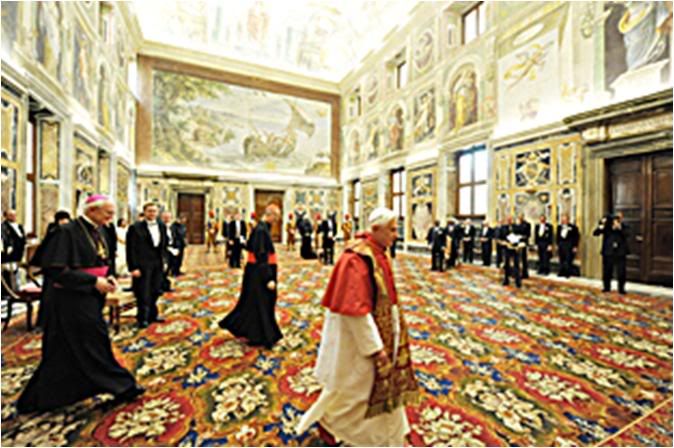 I can't ezplain the OR editor's choice for pictures to accompany this article. They are not just poorly resolved; there is nothing to recommend them in terms of composition, compactness, or adequacy to portray the occasion they are supposed to present.
I can't ezplain the OR editor's choice for pictures to accompany this article. They are not just poorly resolved; there is nothing to recommend them in terms of composition, compactness, or adequacy to portray the occasion they are supposed to present.
[Modificato da TERESA BENEDETTA 18/12/2009 00:17] |
| |
 18/12/2009 05:26 18/12/2009 05:26 |
|
| | | OFFLINE | | Post: 19.107
Post: 1.753 | Registrato il: 28/08/2005
Registrato il: 20/01/2009 | Administratore | Utente Veteran | |
|
 Benedict XVI to Belarus bishops on ad limina visit:
Benedict XVI to Belarus bishops on ad limina visit:
Catholics and Orthodox must bear fraternal witness
together in order to generate peace
Translated from
the 12/18/09 issue of

Renewed unity among bishops, particular attention to the educational emergency, collaboration with the Orthodox to bearcommon witness to that 'fraternity that generates peace', and readiness to work with civilian authorities for the good of all citizens: these were the recommendations of Pope Benedict XVI to the prelates of Belarus on ad limina visit whom he received in audience Thursday morning as one group, after meeting with them in separate groups earlier in the week.
Here is a translation [from the Italian] of the address delivered by the Holy Father in Byelorussian:
Eminence and Venerated Brothers,
I am happy to express to each of you my cordial welcome to the home of the Successor of Peter, to whom Christ entrusted the task of pasturing his flock (cfr Jn 21,15-19), to confirm his brothers in the faith (cfr Lc 22,31), and to protect and promote ecclesial unity (cfr Lumen gentium, 22).
I thank Mons. Alexander Kaskiewicz for the words with with he presented the journey of the Church in Belarus and the challenges that await it.
In the meetings that I have had with you, I appreciated the pastoral zeal with which you carry out your ministry, and the desire and commitment to co-responsibility, communion and sharing of decisions
among you, and may it keep growing so that your service may always be more fruitful.
It is particularly important, in fact, to announce with renewed enthusiasm and incisiveness the perennial message of the Gospel to a society that is not immune to the temptations of secularization, hedonism and relativism: the problems of denatalization, the fragility of the family and the illusion of finding fortune outside one's homeland are its signs.
In the face of such challenges, the urgent task of pastors is to manifest the power of faith, a faith rooted in solid tradition, in order to contribute to preserving the profound Christian identity of your nation, in respectful dialog with other cultures and religions.
In order to reach this objective, it is necessary, in keeping with the invitation of the Psalm, "How good it is, how pleasant, where the people dwell as one!" (Ps 133,1), that you take great care to formulate programs and to promote ever more appropriate pastoral methods while putting into action the decisions of your bishops' conference.
Such renewed unity, besides favoring the announcement of the Gospel, will also promote relations with civilian authorities and, particularly, ecumenical relations.
One other element that I wish to underscore is the special attention in pastoral activity to the educational dimension. As I have said many times, we live today in a kind of 'emergency' in this delicate and essential sector, and it is necessary to multiply efforts to offer a valid formation first of all to the new generations.
Therefore I encourage you to pursue your commitment, taking care that adequate catechesis marks the journey of faith in all the stages of life, in occasions, within and outside the Church, under your leadership, to bring the Message of Christ to every sector of the flock that is entrusted to you.
Of particular importance is your discernment and support for various vocations, especially for the priesthood and religious life, as for programs destined for the human and Christian development of young people.
In this respect, I invite you to be very vigilant that candidates for priesthood receive a solid and rigorous spiritual and theological formation, and are rightly guided in a serious and profound verification of their divine calling. The situation of our society today requires particularly attentive discernment.
Thus, it is important for the future of your Church that in Grozny and Pinsk, you continue to offer to seminarians a complete and well-qualified formative itinerary.
The fact that in both places, candidates for diocesan priesthood and for religious orders share their formation also helps promote unitary pastoral activity. This situation would produce even more promising results if the educational offerings continue to be a product of intense collaboration between the bishop and the various religious superiors, capable of giving life even to initiatives for continuing education of priests.
Be close, with ever increasing solicitude, to your priests, especially those who are just starting their pastoral ministry. The attentive and cordial exercise of the bishop's spiritual paternity constitutes a fundamental element for the success of priestly life.
It is necessary, moreover, to always keep in mind that the Lord calls on you, as Pastors of the Church, to be able to discern every ministry destined for the edification of the ecclesial body - even its secular, cultural and civilian components - so that everyone may contribute to make the Kingdom of God grow in Belarus, in a spirit of true and real communion, in order to recover those Christian values that have contributed decisively to the construction of European civilization.
Dear brothers, know how to value every correct contribution to announcing and spreading the Kingdom of God, testifying with concrete gestures to the fraternity that generates peace; the meekness that accompanies justice; the spirit of communion that avoids personalisms; charity which is "patient and kind, which is not jealous, is not pompous, not inflated, never rude, does not seek its own interests, is not quick-tempered, does not brood over injury, does not rejoice over wrongdoing but rejoices with the truth, bears all things, believes all things, hopes all things, endures all things" for love of Christ (cfr 1 Cor 13,4-7).
In this context, we must situate, among other things, the fraternal collaboration with the Orthodox Church of Belarus, whose Pastors share with you the quest and commitment for the good of the faithful.
The orthodox Churches, like the Catholic Church, are strongly committed to reflecting on how best to respond to the challenges of our time in order to faithfully transmit the message of Christ.
In accepting the invitation that came from the recent Catholic-Orthodox meeting in Cyprus, we must intensify our common journey in this direction. A significant contribution can be offered by the small but fervent Greek Catholic community in your country, which constitutes an important witness for the Church and a gift from the Lord.
A few months ago, I received in audience the President of the Republic of Belarus. In the meeting which was cordial and respectful, both sides reiterated the desire to stipulate an agreement, which is being elaborated. Moreover, I underscored the particular attention with which the Apostolic See, as well as the Bishops' Conference, has followed the events in your country and the commitment to actual collaboration on issues of common interest in order to promote, within the competence of each side, the good of the citizenry.
Venerated Brothers, in renewing my gratitude, I invoke the Mother of God, who is much loved in your country, to sustain and lead you with her protection. With these wishes and with particular affection, I impart on you, your priests and religious and all the faithful a special Apostolic Blessing, assuring you of remembrance in my prayers for all of the Byelorussian people.
Googling for some information about the Church in Belarus, I came upon the website of the Belarus Catholic Church which appears to be very informative (I deduce, with my rudimentary Russian), and more surprisingly, so up to date it already had the story of the audience with the Pope today, not to mention the following pictures of it:
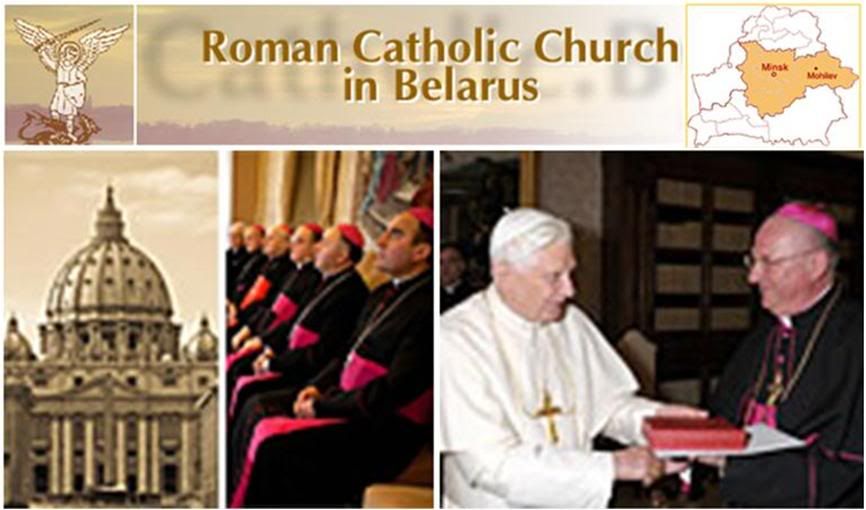
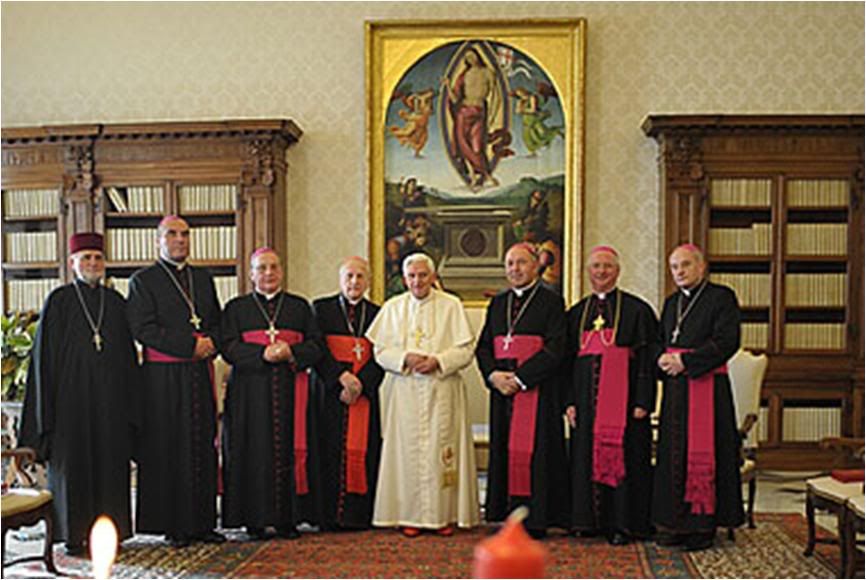
[Modificato da TERESA BENEDETTA 18/12/2009 05:31] |
| |
 18/12/2009 06:13 18/12/2009 06:13 |
|
| | | OFFLINE | | Post: 19.108
Post: 1.754 | Registrato il: 28/08/2005
Registrato il: 20/01/2009 | Administratore | Utente Veteran | |
|
 VESPERS WITH
VESPERS WITH
ROME UNIVERSITY STUDENTS

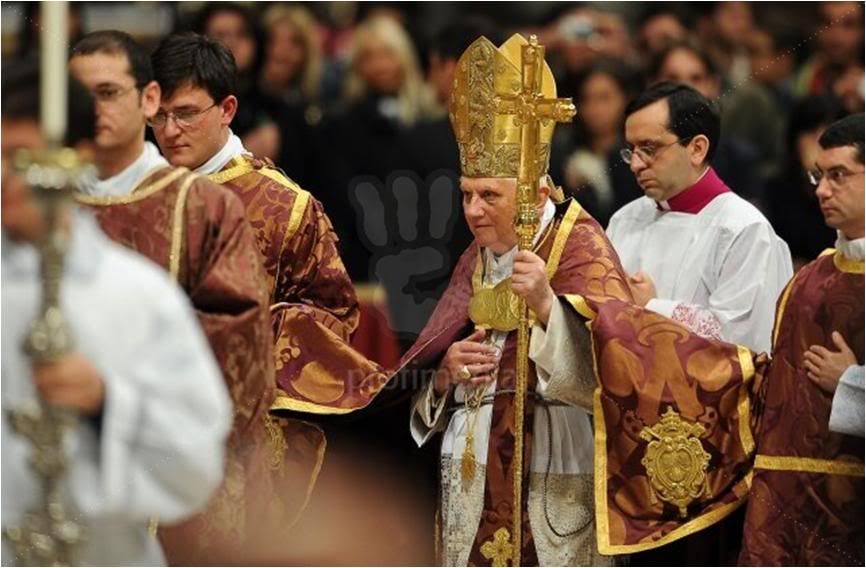
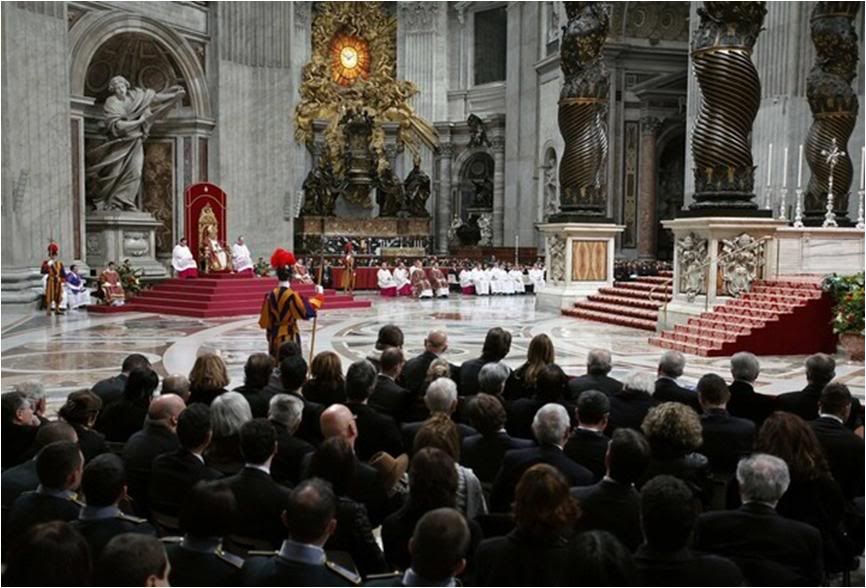
(18 Dec 09 - RV) Pope Benedict XVI prayed Vespers with Roman university students yesterday evening in St. Peter’s Basilica:
Beginning with Vespers for the 17th of December, the Church enters fully into the final stage of preparation for Christmas – the Great and Solemn Feast of the Birth of Our Lord and Saviour.
Vespers are the Church’s official Public Praise of God in the evening, and starting on the evening of December 17th, the Church prays the O Antiphons: seven invocations of the Messiah – the Christ – God’s Chosen One, who will free Israel, break the power of Hell, and restore friendship between Heaven and Earth.
At the conclusion of the Vespers service, a delegation of students from Australia handed over an icon of Mary, Seat of Wisdom to a delegation of students from Africa, for whom the Holy Father especially prayed, as well as for the success of co-operation between Roman and African universities that has been growing since the conclusion of the Special Synod Assembly for Africa.
Pope Benedict’s Homily on Thursday concentrated on the first of the seven O Antiphons: O Wisdom.
The Pope said the Wisdom invoked in the Church’s Thursday Evening Prayer is the Son of God, the Second Person of the Blessed Trinity; the Word, who, as we read in the Prologue to John’s Gospel, “was in the beginning with God,” indeed, “He was God,” and with the Father and the Holy Spirit created all things and “became flesh” to reveal to us the God, whom no flesh can see.
“Dear Friends,” said Pope Benedict, “A Christian professor, or a young Christian student, carries within him the passionate love for this Wisdom! We read all in its light: we discover its traces in the elementary particles and in the verses of poets; in the legal codes and the events of history; in works of art and in mathematical expressions.
Without Her, nothing was made of all that exists (cf. Jn 1:3) and thus can we see a reflection of Her in everything created.
All that human intelligence receives may be so received because, in some way and measure, it participates in creative Wisdom – and it is here, finally, that there rests the very possibility of study, of research, of scientific dialogue in every field of knowledge.
The Pope ended: “May this Christmas bring joy and hope to you, your families and the whole university community throughout the world.
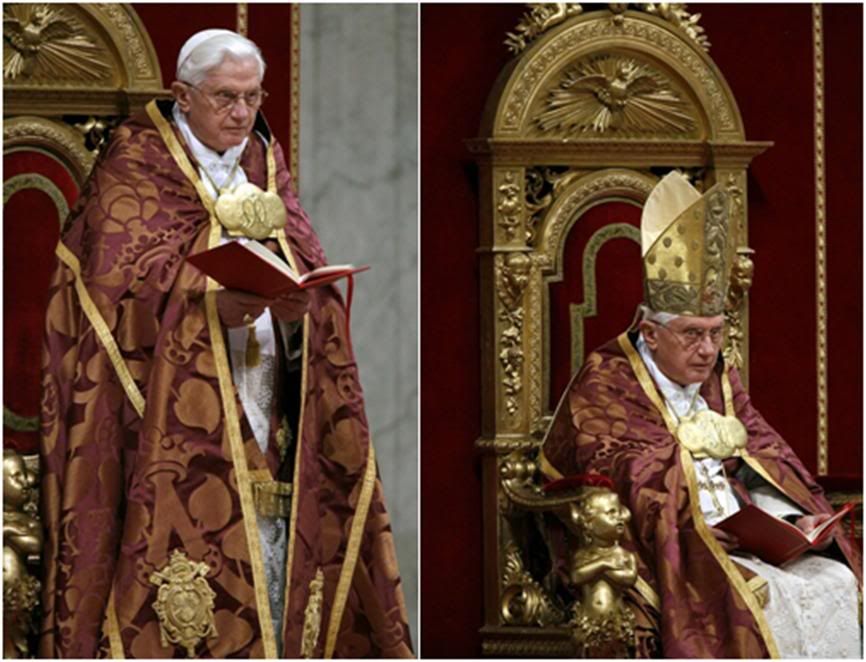 Here is a translation of the Pope's Vespers homily:
Here is a translation of the Pope's Vespers homily:
Eminent Cardinals,
Venerated Brothers in the Episcopate,
Distinguished Ladies and Gentlemen,
Dear brothers and sisters:
What wisdom was born in Bethlehem? This is the question I wish to pose to myself and to you at this traditional pre-Christmas encounter with the Roman university world. Today, instead of Holy Mass, we celebrate Vespers together, and the happy coincidence with the start of the Christmas novena will lead us shortly to sing the first of the so-called Major Antiphons:
"O Wisdom, O holy Word of God,
you govern all creation with your strong yet tender care:
Come and show your people the way to salvation".
(Liturgy of the Hours, Vespers for Dec. 17)
This stupendous invocation is addressed to 'Wisdom', the central figure in the Books of the Proverbs - Wisdom and Ecclesiastes - which are therefore called the 'wisdom books' and in which Christian tradition sees a prefiguration of Christ.
Such an invocation becomes truly stimulating and even provocative, when we are in front of the manger, that is, before the paradox of a Wisdom which, having come out "of the mouth of the Most High', lies wrapped in swaddling clothes in a manger (cfr Lk 2,7,12,16).
We can already anticipate the answer to our initial question: what was born in Bethlehem is the Wisdom of God. St. Paul, writing to the Corinthians, uses this expression: "God's wisdom, mysterious, hidden" (1 Cor 2,7), that is, in a divine plan which remained hidden a long time and which God himself revealed in the story of salvation.
In the fullness of time, this Wisdom took on a human face, the face of Jesus, who - as the Apostolic Creed says - "was conceived of the Holy Spirit, born of the Virgin Mary, suffered under Pontius Pilate, was crucified, died and was buried, descended into hell, the third day arose from the dead, ascended into heaven, seated at the right hand of God the Father Almighty, from whence he shall come to judge the living and the dead".
The Christian paradox consists precisely in the identification of divine Wisdom, the Eternal Logos, with the man Jesus of Nazareth and his story. There is no solution to this paradox outside of the word 'Love', which in this case must be written with a capital L, because it is a Love that infinitely surpasses human and historical dimensions.
Therefore, the Wisdom that we invoke this evening is the Son of God himself, the second person of the Most Holy Trinity. It is the Word, which, as we read in the Prologue to John's Gospel, "was in the beginning with God", and "was God", who with the Father and the Holy Spirit created all things and who "became flesh" to reveal the God that no one had ever seen (cfr Jn 1,2-3.14.18).
Dear friends, a Christian professor, or a young Christian student, carries in himself passionate love for this Wisdom! Read everything in his light; take hold of him in elementary particles and the verses of poets, in juridical codes and the events of history, in artistic works and in mathematical expressions.
Without him, nothing came to be (cfr Jn 1,3), and therefore in every created reality, one can see his reflection, obviously in different degrees and modalities.
Everything that can be received by the human intelligence is possible because in some way and to some measure, they are part of creative Wisdom. And so, in the ultimate analysis, it is the possibility itself of study, of research, of scientific dialog in every field of knowledge.
At this point, I cannot avoid a reflection that is perhaps rather discomforting, but useful for us who are here and who belong for the most part to the academic field.
Let us ask ourselves: on Christmas night, who were there at the cave in Bethlehem? Who welcomed Wisdom at its birth? Who ran to see him, acknowledged and adored him?
Not doctors of the law, scribes or sages. There were Mary and Joseph, and then the shepherds. What does it mean? Jesus would say one day: "Yes, Father, such has been your gracious will" (Mt 11,26): you have revealed your mystery to the little ones [cfr Mt 11,25).
But does it not serve anything then to study? Is it outright harmful, counter-productive to knowing the truth? The history of 2000 years of Christianity excludes this last hypothesis and suggests to us the right answer: that one must study and deepen one's knowledge while keeping a 'childlike' spirit, a humble and simple spirit, like that of Mary, Seat of Wisdom.
How many times have we feared to approach the cave in Bethlehem because we have been concerned that this would be an obstacle to our critical faculties and our 'modernity'! Instead, if we came near, then each of us can discover the truth about God and that human being: they met in that baby, born of the Virgin Mary. Man's yearning for eternal life had softened the heart of God who did not recoil to take on the human condition.
Dear friends, to help others discover the true face of God is the first form of charity, which for you assumes the form of intellectual charity. I have noted with pleasure that the theme for the diocesan pastoral ministry in the universities this year is "The Eucharist and intellectual charity" - a demanding but appropriate choice.
In fact, in every Eucharistic celebration, God enters history in Jesus Christ, in his Word and his Body, giving us that charity which allows us to serve man in his concrete existence.
The project "A culture for the city" offers a promising proposition of Christ's presence in the cultural field. So while I hope that your pastoral course will be fruitful, I must also invite all the universities to be places of formation for authentic workers in intellectual charity. The future of society will depend largely on them, especially in the elaboration of a new humanistic synthesis and a new capacity to apply it (cfr Enc. Caritas in veritate, 21).
I encourage all the responsible officials in academic institutions to proceed together, collaborating in the construction of communities in which all young people are formed to become mature and responsible men who can realize the 'civilization of love'.
At the end of this celebration, an Australian university delegation will turn over to an African delegation the icon of Mary Sedes Sapientiae (Seat of wisdom). Let us entrust to the Blessed Virgin all the university students on the African continent, along with the commitment for cooperation which in the months following the Special Synodal Assembly for Africa, has been developing between the universities of Rome and Africa.
I renew my encouragement for this new prospect of cooperation and I hope that it may give rise to cultural projects that are able to promote the integral development of man.
Dear friends, may the coming Christmas bring joy and hope to you, your families and the entire university community in Rome and around the world.
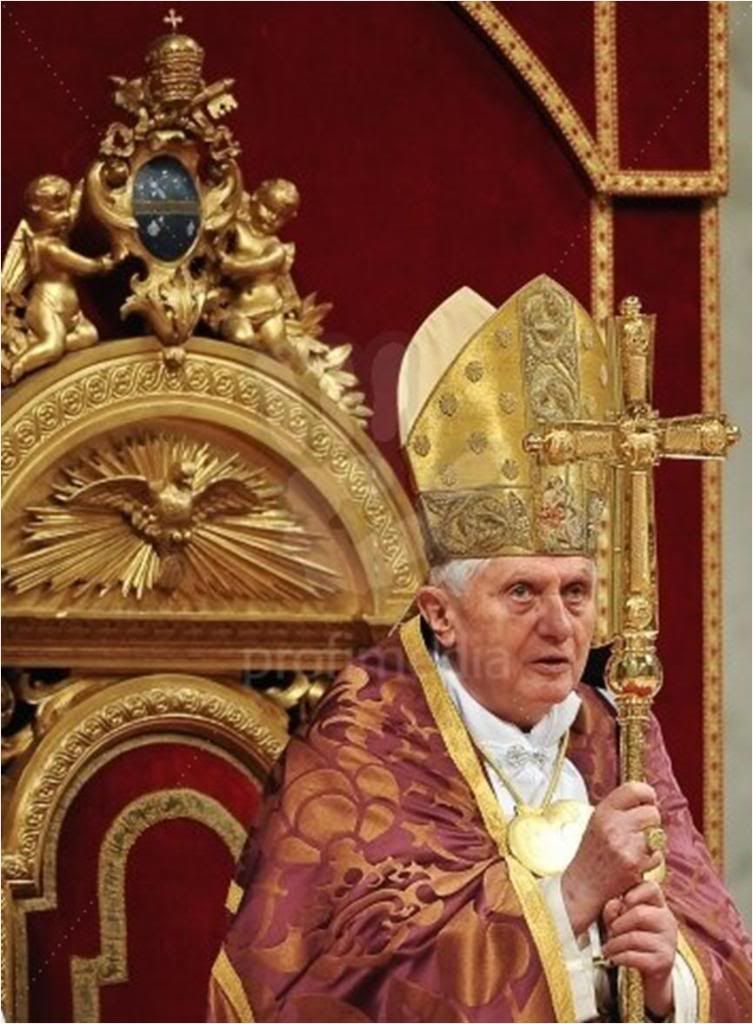
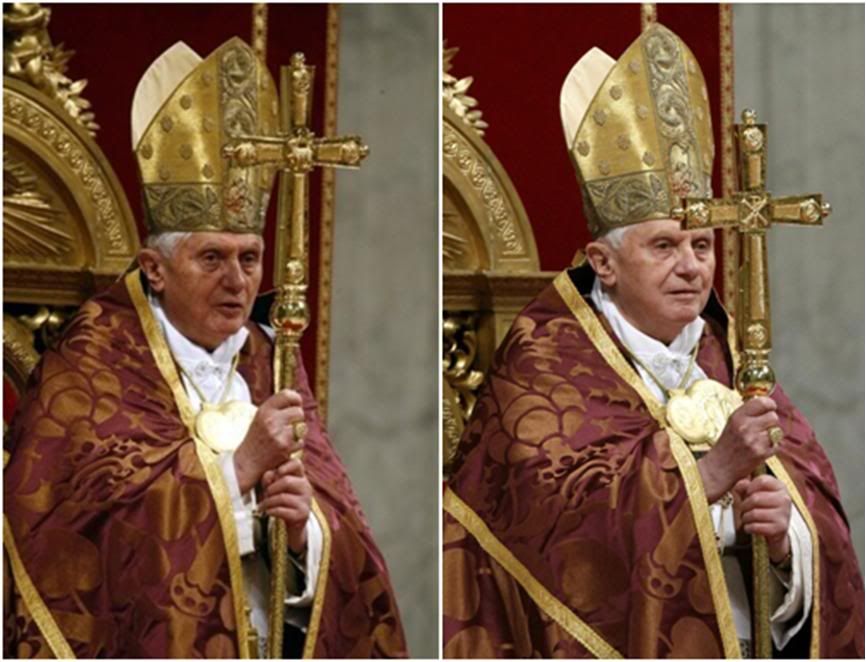
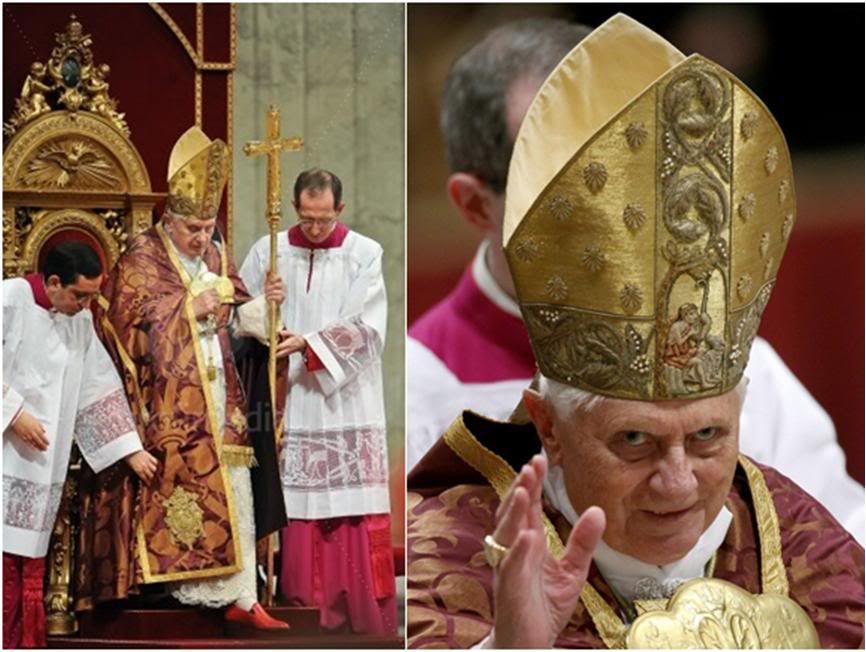
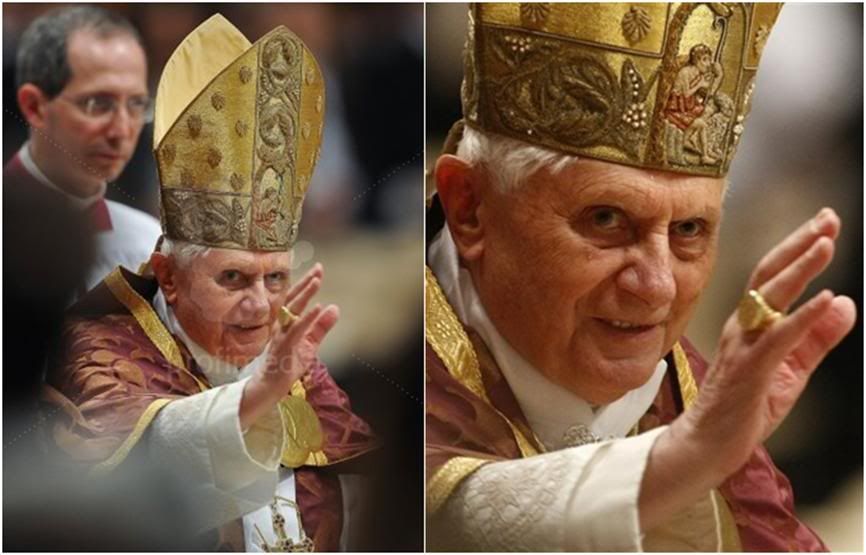
[Modificato da TERESA BENEDETTA 18/12/2009 22:44] |
| |
 18/12/2009 14:14 18/12/2009 14:14 |
|
| | | OFFLINE | | Post: 19.109
Post: 1.755 | Registrato il: 28/08/2005
Registrato il: 20/01/2009 | Administratore | Utente Veteran | |
|
 Friday, December 18
Friday, December 18
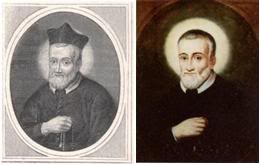 BLESSED ANTHONY GRASSI (Italy, 1591-1671), Priest
BLESSED ANTHONY GRASSI (Italy, 1591-1671), Priest
Born in Fermo, northeast Italy, near Loreto, he was a devotee of Our Lady of Loreto
from his childhood. He became an Oratorian father [St. Philip Neri's order] known
for his unflappable serenity and his gifts as a father confessor and spiritual
counselor in his hometown. In 1621, he was struck by lightning while praying at
the Loreto shrine and was electrocuted so badly he was paralyzed and was expected
to die. But he survived, and threafter, he made an annual pilgrimage to Loreto. In
1625, he was named superior of the Oratorians in Fermo. His basic rule for everyone
was 'ad litteram', meaning follow orders to the letter. His central passion was the
daily Mass and Adoration in a long life that was otherwise unremarkable. In old age,
as he lost his physical faculties, his Archbishop came to give him Communion every
day. He was beatified in 1900.
OR today.
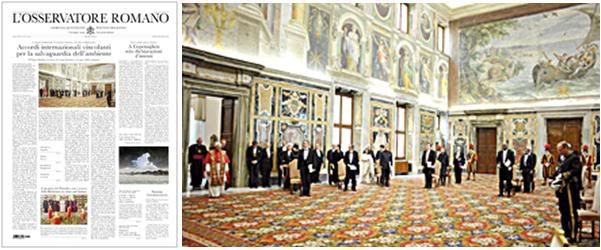
Benedict XVI tells 8 new ambassadors he hopes for
'Binding international agreements to protect the environment'
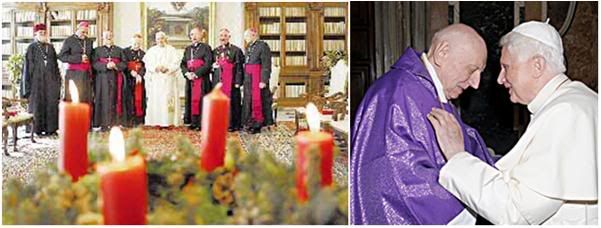 Other papal stories on Page 1: The Holy Father's meeting with the bishops of Belarus; the Mass to celebrate
Other papal stories on Page 1: The Holy Father's meeting with the bishops of Belarus; the Mass to celebrate
the 90th birthday of Czech Cardinal Thomas Spidlik; and the reduction of Emmanuel Milingo to laical state.
The only international story on Page 1 is that the Copenhagen climate change conference expects at best
a declaration of intentions from participating governments.
THE POPE'S DAY
At 9 a.m., the Holy Father attended the third and last Advent sermon by the Preacher of the Royal Household
at the Redemptoris Mater chapel.
Later he met with
- Cardinal Leonardo Sandri, Prefect of the Congregation for Oriental Churches
- Cardinal Joseph Zen Ze-kiun, emeritus Bishop of Hong Kong
- Belgian pilgrims who formally presented this year's Vatican Christmas tree which came from
the Ardennes forest in the Walloon region. Remarks in French.
|
| |
 18/12/2009 15:00 18/12/2009 15:00 |
|
| | | OFFLINE | | Post: 19.110
Post: 1.755 | Registrato il: 28/08/2005
Registrato il: 20/01/2009 | Administratore | Utente Veteran | |
|
 Well, I am glad someone has finally put a stop to all the previous nonsense about the Pope staying at Buckingham Palace when he visits the UK, but I object strenuously to the second part of the Times headline which is obviously wrong and designed to impress a most negative idea about the Pope in the mind of the casual reader who hardly ever gets past the headline, since the story itself says nothing of the sort...
Pope declines UK state pomp
Well, I am glad someone has finally put a stop to all the previous nonsense about the Pope staying at Buckingham Palace when he visits the UK, but I object strenuously to the second part of the Times headline which is obviously wrong and designed to impress a most negative idea about the Pope in the mind of the casual reader who hardly ever gets past the headline, since the story itself says nothing of the sort...
Pope declines UK state pomp
and avoids apology over Ireland abuse
by Ruth Gledhill, Religion Correspondent

Dec. 18, 2009
The Pope will not stay at Buckingham Palace and has declined an open-carriage procession and palace banquet during his state visit to Britain next year.
Although Pope Benedict XVI will be a guest of the Queen he will stay with his Ambassador to the Court of St James, the Apostolic Nuncio, at his house in Wimbledon, southwest London.
The Pope will spend one day in Scotland during the three-day visit from September 16 to 19. In spite of pleas from lay members of the Roman Catholic Church in Ireland for him to visit them and apologise in person for decades of child abuse by members of the clergy exposed in a recent report, he is unlikely to do so before 2012.
[And Gledhill's editors interpret that as 'avoids apology over Ireland abuse'??? Typical liberal poison-pen headline not supported by the story itself!
Ireland is another country, and to visit it this time would mean a whole new set of arrangements to be made. And since when is a Pope compelled to 'apologize in person' onsite for anything? An apology is an apology anywhere it is made, and any apology from the Pope, wherever he makes it, resounds infinitely more than any run-of-the-mill apology because of the global coverage it gets.
Obviously, all our sympathies go to the victims of clerical abuse, but it's hard to be sympathetic to those who not only want a literal pound of flesh hacked off the Pope but also to grind his face in the dirt while doing so. Typically, such victims and their families and advocates are relentlessly unforgiving, and one might say it is understandable, under the circumstances, but it is also most un-Christian.
However, given the ways of the world and persistent bias against the Church and the Pope, even among nominal Catholics. I am sure Benedict XVI realizes that he will always be made the scapegoat for any offenses committed by Roman Catholic clergy, is spiritually prepared for it, and fortified by the Lord's grace.]
Jim Murphy, a Catholic MP who is Secretary of State for Scotland and heads the government team in charge of the visit, said that while it would have the status of a state visit, the Vatican did not want the trappings that accompany such a visit.
“It’s a unique constitutional arrangement as the Pope is head of a faith and the head of state,” Mr Murphy told The Tablet, the Catholic weekly.
“The official title is ‘papal visit with the status of a state visit’. Normally state visits include banquets and gold carriages but the Vatican doesn’t want that.”
The Catholic Bishops’ Conference of England and Wales and the Bishops’ Conference of Scotland have drawn up an itinerary that is now with the Holy See and includes public Masses and ecumenical events. The Pope will meet the Queen in Scotland, where she will be at Balmoral.
The organisers will be anxious to avoid embarrassing conflict with Anglicans, as arrangements move forward for new Anglican Ordinariates for traditionalists who wish to convert to Catholicism.
There had been speculation that the papal visit might be downgraded from state to pastoral because of embarrassment over the offer to traditionalists, regarded by some Anglicans as an attempt to poach from their flocks.
One Catholic bishops’ conference has already gone so far as to give traditionalist Anglicans a church for Christmas.
In Scotland, Catholic Anglicans will this year celebrate Christmas in a Catholic chapel in a convent. St Catherine’s convent chapel in Tollcross, Edinburgh, was a gift from Scotland’s Catholic bishops and was made available by the Archdiocese of St Andrews and Edinburgh.
Canon Len Black, a Scottish Episcopal priest in Inverness, said there were no traditionalist parishes in Edinburgh but up to 50 lay men and women who needed a traditional service.
The Scottish Episcopal Church, one of 38 provinces in the worldwide Anglican Communion, last week shortlisted a woman for an episcopal vacancy, meaning that Scotland could have the UK’s first Anglican woman bishop.
Canon Black welcomed the unprecedented Christmas gift.
“This move has come about because of the rapid drift of the Scottish Episcopal Church away from the traditional faith, morals and practices of the universal Church,” he said.
“When the Scottish Episcopal Church first decided to ordain women as priests some 15 years ago we were assured of a ‘valued and honoured place’ within the Church ‘for all time to come’.
“That promise has not been honoured and today some of our people even find that they are being told they are no longer welcome in the churches in which they were baptised as infants. Now we find that the provision we were hoping for from our own Church is being offered to all disaffected Anglicans by the Catholic Church.”
Cardinal Keith O’Brien, the Catholic Archbishop of St Andrews and Edinburgh, commented: “I am delighted to help provide a place of worship for these traditionalist Anglicans, taking the lead from Pope Benedict XVI and his predecessor Pope John Paul II.”
[Modificato da TERESA BENEDETTA 18/12/2009 15:01] |
| |
 18/12/2009 15:47 18/12/2009 15:47 |
|
| | | OFFLINE | | Post: 19.112
Post: 1.757 | Registrato il: 28/08/2005
Registrato il: 20/01/2009 | Administratore | Utente Veteran | |
|

 The Italian news agencies carried this news today, which it turns out, was reported yesterday by ROME REPORTS, but I didn't see it. Sorry...
Benedict XVI to declare
The Italian news agencies carried this news today, which it turns out, was reported yesterday by ROME REPORTS, but I didn't see it. Sorry...
Benedict XVI to declare
John Paul II 'Venerable' tomorrow

December 17, 2009 - The late Pope John Paul II is one step closer to getting a spot on the altars, now that Benedict XVI will name him venerable.
Benedict XVI is expected to sign the decree Saturday December 19th.
When the Pope gives a candidate to the altars, the title "venerable" that means he recognizes that they lived the Christian virtues as heroes.
To beatify a candidate, the commission of cardinals and Vatican theologians must certify that God has performed a miracle through his intercession.
In the case of John Paul II, just two months after his death, several medical teams have classified the cure of a French nun with Parkinson's, as “scientifically inexplicable”. The nun says, with much difficulty, she wrote John Paul II name on a piece of paper and a couple of hours later she was 100% cured.
To name John Paul II 'Venerable', Pope Benedict XVI analyzed the documentation collected during the last 5 years by the postulator of the Cause of beatification, Father Slawomir Oder. Thousands of pages with specific facts and that show what many proclaimed the day of his funeral: that John Paul was a saint.
John Paul II road to sainthood, is perhaps one of the shortest on record. It started just one month after he died. And lasted only 5 years. The traditional road to sainthood usually takes 10 times as long.
An earlier report from Australian news agencies citing sources at the Vatican Congregation for the Causes of Sainthood anticipate that the major decree to be announced by the Pope before Christmas will the canonization of Mother Mary McKillop, who would become the first Australian saint.
The same reports said that both John Paul II and Pius XII were to be declared 'Venerable'. And an Italian report today says that also to be declared 'Venerable' is a protege of John Paul II, the Polish priest Jerzy Popieluszko, believed martyred by the Communists for his role in rallying the Polish people against the regime at the Solidarity rallies of the 1970s. |
| |
 18/12/2009 16:17 18/12/2009 16:17 |
|
| | | OFFLINE | | Post: 19.113
Post: 1.758 | Registrato il: 28/08/2005
Registrato il: 20/01/2009 | Administratore | Utente Veteran | |
|

 Inside and outside the Vatican,
Inside and outside the Vatican,
2009 was busy year for the Pope
By John Thavis

VATICAN CITY, Dec. 18 (CNS) -- Looking back on 2009, it's difficult to imagine a busier year for 82-year-old Pope Benedict XVI.
The Year of St. Paul. The Year for Priests. A major social encyclical. A Holy Land pilgrimage. A first meeting with President Obama. Ten new saints. An African trip and an African synod. A Facebook debut. A controversial concession to Catholic traditionalists. An unexpected overture to disaffected Anglicans.
And those are just the highlights, of course. Being Pope is a day-in, day-out ministry, and over the course of the past year Pope Benedict met with more than 200 dignitaries and groups, held talks with more than 300 bishops and celebrated more than 50 major liturgies.
The year brought moments of deep personal satisfaction, as when the German pontiff prayed in silence before Christ's empty tomb in Jerusalem, or when he arrived on his first African visit to a tumultuous welcome by hundreds of thousands of Cameroon residents.
But the Pope's disappointment was also evident in 2009, in part because he felt misunderstood by some of his own faithful and the mass media over difficult decisions or statements.
In January, the Pope announced that he was lifting the excommunications of four bishops of the Society of St. Pius X to open the way toward reconciliation talks with the traditionalist group -- a move that had been opposed by some bishops in several countries.
Media attention quickly focused on the fact that one of the four, Bishop Richard Williamson, had given interviews denying the extent of the Holocaust. Suddenly the German-born Pope was on the defensive, having to assure Jewish leaders and others that his initiative aimed at Church unity and in no way represented a backtracking on the Church's teachings against anti-Semitism. [Which should have been obvious except to his habitual faultfinders within the Church, the media and militant Jewish circles, who will never pass up the occasion to provoke a major dust-up against the Pope.]
One of the most remarkable documents of 2009, in fact, was the Pope's subsequent letter to the world's bishops expressing his amazement that even some Catholics had misunderstood him and attacked him "with open hostility."
[The March 10, 2009, letter was, for me, the most important papal event of 2009, and perhaps, of Benedict XVI's Papacy so far. I look at it as the most remarkable papal document in modern times, bar none, because of the deep personal emotion that runs through the whole letter (nornally much tempered in papal documents).
But it also happens to be the most cogent analysis and expression of the crisis in the faith today - the absence or marginalization of God in contemporary society - and the Christian mission to make his presence actual in the world by their own testimony of love and unity.
Too bad it would seem that the bishops to whom it was addressed are ignoring it, just as they have mostly ignored Benedict XVI's equally heartfelt letter to them accompanying Summorum Pontificum, even though the scope of that letter was necessarily limited to the continuity of tradition in liturgy, and liturgy as lex credendi.]
The Pope's visit to Africa in March was a weeklong experience of intense liturgies, discussions with bishops and moving encounters with youth, the disabled and even a group of Pygmies.
But the media impact was overshadowed by the Pope's remarks to reporters on the first day of the trip, when he spoke of the Church's strategies against AIDS and said, "One cannot overcome the problem with the distribution of condoms. On the contrary, they increase the problem." The comment drew widespread criticism, although some experts agreed that over-reliance on condoms was a problem in African countries.
The Synod of Bishops for Africa in October brought the continent back into the Vatican spotlight. The Pope presided over the synod's assemblies and, at the conclusion, received 57 pastoral proposals to elaborate into a future document on the Church in Africa.
In May, Pope Benedict traveled to Jordan, Israel and Palestinian territory. The eight-day trip was a biblical pilgrimage, an interfaith mission and a political balancing act all rolled into one.
The Pontiff visited a mosque in the Jordanian capital, prayed at the Yad Vashem Holocaust memorial in Jerusalem, and blessed cornerstones for new Christian churches and facilities in the region.
In June, the Pope closed the Year of St. Paul and opened the Year for Priests. In weekly talks and liturgical celebrations focusing on St. Paul, the Pope sketched a detailed portrait of the man considered the model of Christian conversion and the archetypal missionary.
In launching the Year for Priests, the Pope said the church must acknowledge that some priests have done great harm to others, but it also must thank God for the gifts the majority of priests have given to the church and the world.
In July, the Pope issued his long-awaited encyclical on economic and social justice, "Charity in Truth." It called for reform of international economic institutions and practices, and said the global economic crisis stemmed in large part from the moral failures of greedy financiers and investors.
The Pope gave a copy of his encyclical to President Barack Obama when the two leaders met for the first time at the Vatican in July, along with a copy of a recent Vatican document on biomedical ethics.
In their private talks, which the Vatican said took place in an atmosphere of "great serenity and great cordiality," the President "explicitly expressed his commitment to reducing the numbers of abortions and to listen to the Church's concerns on moral issues," the Vatican said. [Which Obama obviously said with his usual facility for saying things he does not mean or are outright lies!]
In September, Pope Benedict welcomed the new U.S. ambassador to the Vatican, Miguel Diaz, and in a speech outlined wide areas of potential cooperation with the Obama administration. At the same time, echoing concerns by U.S. church leaders, the Pope called for respect for the life of the unborn and protection of the right to conscientious objection on the part of health care workers.
Among the new saints proclaimed by the Pope in 2009 were two with strong U.S. connections: Father Damien de Veuster, the 19th-century Belgian missionary who ministered to people with leprosy in Hawaii, and Sister Jeanne Jugan, a French nun whose Little Sisters of the Poor continue to assist the elderly in the United States and more than 30 other countries.
In internal church matters, the Pope in May ordered an apostolic visitation of the Legionaries of Christ and their institutions following disclosures of sexual impropriety by the order's late founder, Father Marcial Maciel Degollado.
In October, the Vatican unveiled Pope Benedict's new plan for welcoming Anglicans who want to be in full communion with the Roman Catholic Church while preserving aspects of their Anglican spiritual and liturgical heritage.
As the year wound to a close, the Pope buffed up his "green" credentials [That's not a very nice way of putting it, as though he were any politician seeking to inflate his CV and get on a fashionable bandwagon - I wish journalists occasionally stopped to edit themselves, because I am sure Thavis did not mean what his formulation seems to imply. Also, it's not as if the Pope was expressing his views about 'safeguarding Creation' for the first time! - It would have been good if Thavis had recounted all the times he did so in the past 12 months, starting with his Christmas speech to the Roman Curia last December] in his message for World Peace Day 2010.
The message said degradation of the environment is a pressing moral problem that threatens peace and human life itself, and called for action on a global and personal level.
[Modificato da TERESA BENEDETTA 18/12/2009 16:51] |
| |
 18/12/2009 20:51 18/12/2009 20:51 |
|
| | | OFFLINE | | Post: 19.115
Post: 1.761 | Registrato il: 28/08/2005
Registrato il: 20/01/2009 | Administratore | Utente Veteran | |
|
  Anticipating the Pope's Christmas, 2009
Anticipating the Pope's Christmas, 2009

ROME, Dec. 18 (Translated from Apcom) - Christmas with his household staff (two secretaries and four housekeepers) for Pope Benedict XVI, a simple celebration as usual. Gifts to and from his staff, and a traditional German Christmas lunch coming straight from Germany, on his fifth Christmas as Pope.
His Christmas card this year carries a Latin inscription that says "The light shines on us today because the Savior is born". [I have searched online, and there is no image so far of the card. We never saw the one for 2008 either. The Vatican press Office should have a definite policy about this. In the first three years, it made available images of both the Christmas and Easter cards sent by the Pope. Why have they stopped doing so?]
The German Christmas lunch will reportedly include canederli (dumplings with bacon), white sausages, sweet mustard and lebkuchen (Bavarian cookies).
A novelty this year is the possibility to send Christmas greetings to the Pope through Facebook. The Pontifical Council for Social Communications has opened a channel in Pope2You to facilitate such greetings, to which photos may be attached. Once posted, the Vatican IT system will print them out to be delivered as cards to the Pope himself.
The most beautiful greetings will be displayed on the various Vatican social-networking pages.
As previously announced, the Christmas Eve Mass celebrated by the Pope in St. Peter's Basilica will start at 10 p.m. this year instead of midnight.
The following day, Christmas Day, he will deliver his Christmas message Urbi et Orbi at noon from the central loggia of the Basilica.
On December 26, he will lead the noon Angelus [I don't know why - it's Saturday and not a religious holiday], and on Sunday, Dec. 27, he will have lunch with the indigent at the Sant'Egidio soup kitchen in Trastevere. [I think he will lead the Sunday Angelus before going to the soup kitchen where he is not expected until 1 p.m.]
This afternoon, the Christmas tree on St. Peter's Square will be lit. It is a 90-year-old 90-foot tree from the Belgian resort town of Spa in the Ardennes.
The Nurseries Union of the Ardennes also donated forty smaller trees for the papal apartment, the Sala Clementina and various offices in the Vatican.
Tickets for the Christmas Eve Mass have long been 'sold out'. The Pontifical Household distributed 10,000. Similarly gobbled up were the tickets for the Vespers and Te Deum on December 31 and for the New Year's Day Mass the next day.
[The Apcom report does not say anything about it but for the past four years, the Pope's brother, Mons. Georg Ratzinger, has come to the Vatican around December 28 from his home in Regensburg to spend the New Year and his birthday on January 15 with his brother.]
P.S. I have found the Pope's 2009 Christmas card in BILD, the German tabloid. I rotated and cropped the right photo to try and get the message side clearly, but the picture does not resolve well when enlarged.
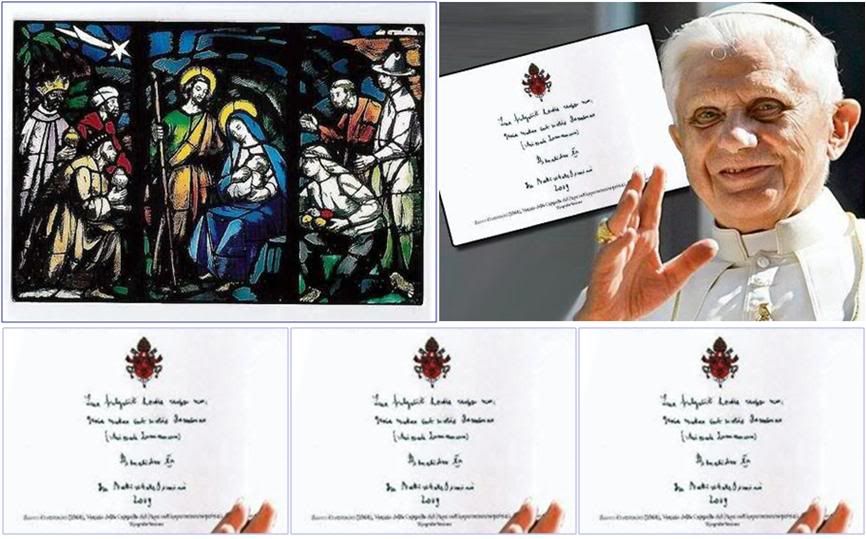 The legend at the bottom of the card says the illustration is from a stained-glass panel in the Pope's private chapel at the Apostolic palace, executed in 1964 by Italian artist Silvio Consadori (1909–1994). The Latin inscription „Lux fulgebit hodie super nos; quia natus est nobis Dominus“ is from the Roman Missal.
The following is an item I would normally post in BENADDICTIONS, but I am adding it here for thematic continuity.
The Pope's Christmas courier
The legend at the bottom of the card says the illustration is from a stained-glass panel in the Pope's private chapel at the Apostolic palace, executed in 1964 by Italian artist Silvio Consadori (1909–1994). The Latin inscription „Lux fulgebit hodie super nos; quia natus est nobis Dominus“ is from the Roman Missal.
The following is an item I would normally post in BENADDICTIONS, but I am adding it here for thematic continuity.
The Pope's Christmas courier
from Bavaria began work before Advent
by Barbara Just

MUNICH, Nov. 27 (Translated from KNA) - On a warm spring-like November afternoon in a nursery in West Munich, bank director Thaddaeus Kuehnel drives up with his Mercedes and backs carefully towards the open gate of the greenhouse.
The 62-year-old man is evidently nervous. Although no one could possibly think of Christmas in this warmth, he is - he must load more than 40 festively decorated Advent wreaths into the car. The destination for the precious cargo? The Vatican.
"How will all this fit?" he worries. But his good friend Robert Zwirner calms him down. Every year, he packs in wreath after wreath along with several boxes of pre-wired replacement candles into the trunk of the car and on the back seat.
"We'll manage it this time, as well", Zwirner is certain and unconcerned.
The problem came earlier. The ex-gardener of St. Boniface Abbey, Brother Ansgar Moessmer, 90, had intended to make all the wreaths himself as in previous years. But the Benedictine monk had broken his hip in a fall and was hospitalized.
Thank God, another gardener, Marille Schuster, volunteered to make the wreaths. The largest wreath is at least a meter in diameter. Like all the rest, it is decorated with gold-edged red ribbons, golden floweers and golden bulbs. During Advent, they are to adorn every room in the Apostolic Palace where the Pope's guests are received, as well as the Pope's apartment and private chapel.
The wreaths come with red candles which were chosen because, says Kuehnel, "That is how the Pope remembers them and treasures them from his childhood".
Since 1982 when Joseph Ratzinger moved to Rome to become Prefect of the Congregation for the Doctrine of the Faith, Kuehnel has regularly brought him delicacies and traditional decorations from his Bavarian homeland.
Advent wreaths are not a common tradition in Italy. "South of Trentino, they don't recognize what they are", Kuehnel notes.
Once he packed a couple of wreaths in his suitcase to bring to Rome. A Customs agent had him open his bags in Rome and when he saw the wreaths, he assumed they were for a funeral. "He apologized and expressed his condolences," Kuehnell recalls, amused.
But to bring just a suitcase of goodies on his holiday runs has long become inadequate. Since Cardinal Ratzinger became Pope in 2005, the demand in Rome for Advent decorations and Christmas goodies has soared - more and more, Germans who work and live in the Vatican also want them. Among his earliest 'new' customers were a former Nuncio to Germany and Cardinal Lajolo, governor of Vatican city state [though he is not German).
Obviously, Kuehnel must also think of papal scretary Mons. Georg Gaenswein, the Pope's four housekeepers (all Italian), Cardinal Augustin Mayer and Bendictine primate, Abbot Notker Wolf.
Kuehnel's Mercedes is almost like a long-distance "Bavarian care package' delivery van. He uses even the storage space under the trunk floor for chocolate Santas, cans of white sausage, sweet mustard, horseradish and coffee from a famous Munich coffee roaster.
Six homemade candles of beeswax from the enterpreneur-artist Claus Hipp (who tends beehives in his spare time) are not going on this trip.
Kuehnel says he will take them to Rome on his trip just before Christmas when he undertakes the 11-hour car trip once more to deliver three five-meter Christmas trees from Bavaria to the Pope.
And as always, he expects the ride will end with an invitation to lunch with the Pope.
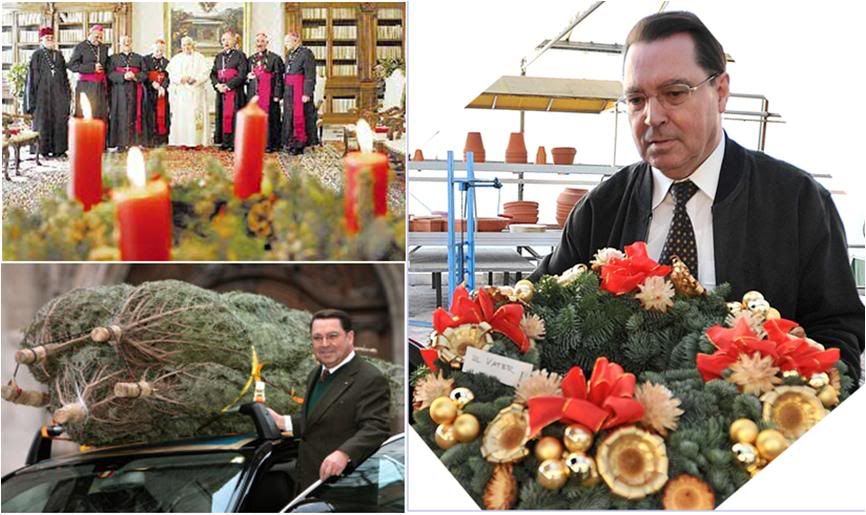 Top left photo, one of Kuehnel's wreaths provides a suitable foreground for the Pope's group picture with the bishops of Belarus; right and bottom left, Kuehnel with a new wreath, and with Christmas trees to bring to Rome.
I am adding some material from a Guardian article on Kuehnel last Christmas:
Top left photo, one of Kuehnel's wreaths provides a suitable foreground for the Pope's group picture with the bishops of Belarus; right and bottom left, Kuehnel with a new wreath, and with Christmas trees to bring to Rome.
I am adding some material from a Guardian article on Kuehnel last Christmas:
When Joseph Ratzinger left Bavaria to become cardinal of the Roman Curia, Thaddaeus Kühnel promised to be his driver during home visits in the German south. Since then, the banker drives to Rome at least three times a year to bring the Pope gifts from the state.
He has already spent some 250,000 kilometres behind the steering wheel of his official car – the equivalent of driving around the world six times for the his holiness.
When the Cardinal became Pope Benedict XVI in 2005, Kühnel, 62, offered to be at his beck and call whenever he wished to stock up on German delicacies that are hard to come by in Rome, including sausages, strudel and dumpling mix.
Lebkuchen (honey and spice biscuits), stollen (German Christmas cake), and chocolate were among the treats, Kühnel told German media. Of the trees, which came from the Pope's home town, Marktl am Inn, Kühnel said: "One is for the Pope's living room, and two are for private chapels."
Butchers in Marktl am Inn began selling Ratzinger sausages in his honour when he became Pope in 2005.
Kühnel said he had already clocked up around 250,000km (150,000 miles) in his car, delivering goods to the pope that he had personally requested, along with presents from his old friends, staff and distant relatives.
"I deliver all the things he misses about Bavaria, including fruit nectar, Bavarian sausages from his favourite restaurant, advent wreaths and German sweets. He has a very sweet tooth," Kühnel said.
"The first thing I brought to Rome, in my car, was a paschal candle, as well as some fruit from Adelholzen and mineral water. He likes the Christmas cookies that women from Bavarian parishes bake at home as well as those made at certain monasteries. He also likes the chocolates made in Aachen."
[Modificato da TERESA BENEDETTA 19/12/2009 00:33] |
| |
 19/12/2009 10:00 19/12/2009 10:00 |
|
| | | OFFLINE | | Post: 19.116
Post: 1.762 | Registrato il: 28/08/2005
Registrato il: 20/01/2009 | Administratore | Utente Veteran | |
|

 Pope lights Vatican's
Pope lights Vatican's
'eco-friendly' Christmas tree

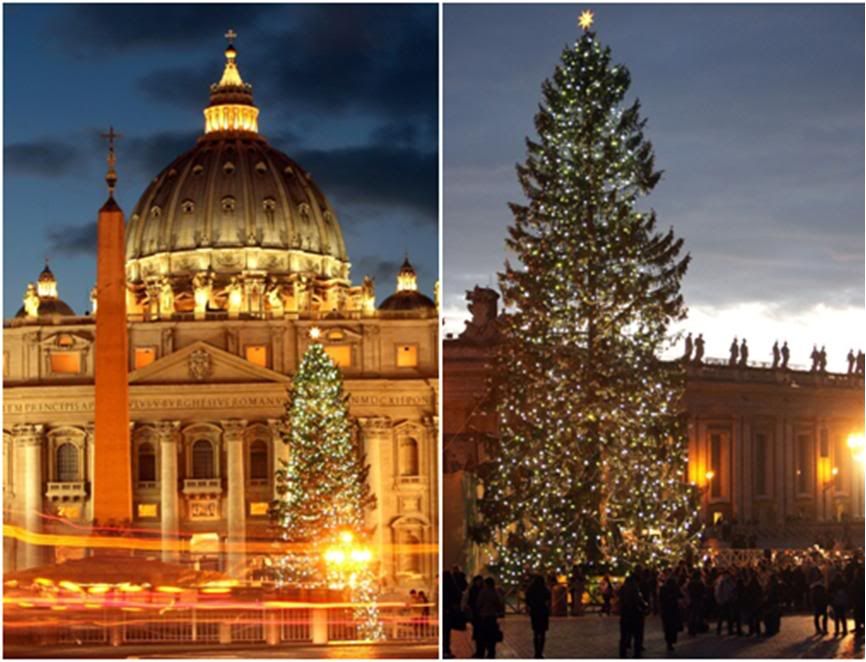
Vatican City, Dec. 18 (dpa) - Pope Benedict XVI on Friday triggered a remote switch to light hundreds of golden bulbs on the Vatican's Christmas tree, a 30-metre high spruce from the forests of the Ardennes in Wallonia, Belgium.
The Christmas tree, adorned with gold and silver mirror-glass baubles and strands of tinsel, stood in the centre of St Peter's Square and is part of a tradition begun by Pope John Paul II in 27 years ago.
Benedict followed the ceremony from his Apostolic Palace residence overlooking the square.
A gift from Wallonia's regional government, the tree is around 100-years-old.
Its use has been described as "ecologically-friendly," because, according to the Vatican, it was felled as part of a programme to allow for the reintroduction and growth of other trees and plants that are more native to the Ardennes area.
Also, once Christmas celebrations have ended, wood from the tree, which measures some seven metres in diameter and weighs 14 tons, is to be used to make carved statues which will be sold, with the money going to the poor.
Since his 2005 election, Benedict has frequently urged governments to adopt measures aimed at safeguarding the environment, a call the pontiff repeated this week as world leaders are meeting at a United Nations conference on climate change in Copenhagen, Denmark.
Benedict's predecessor, the late Polish-born Pope John Paul II, in 1982 introduced the northern and eastern European custom of Christmas trees to the Vatican.
On Christmas Eve the Vatican, also in St Peter's Square, unveils its creche, or nativity scene, a greater-than-lifesize model depicting the birth of the baby Jesus, traditionally in a manger or cave.
Earlier Friday, the Holy Father met with a group of pilgrims who travelled to Rome from Belgium to present the Christmas tree formally, and to attend the lighting-up ceremony.
'The Lord visited and
ransomed the world'
Translated from
the 12/19/09 issue of

Christians are called on to show with their lives that 'the world has truly been visited and ransomed by the Lord".
Benedict XVI underscored this Friday noon sat the Sala Clementina of the Apostolic Palace when he received a delegation from Belgium who had come to formally present the Christmas tree on St. Peter's Square which came from the Ardennes Forest near the resort town of Spa.
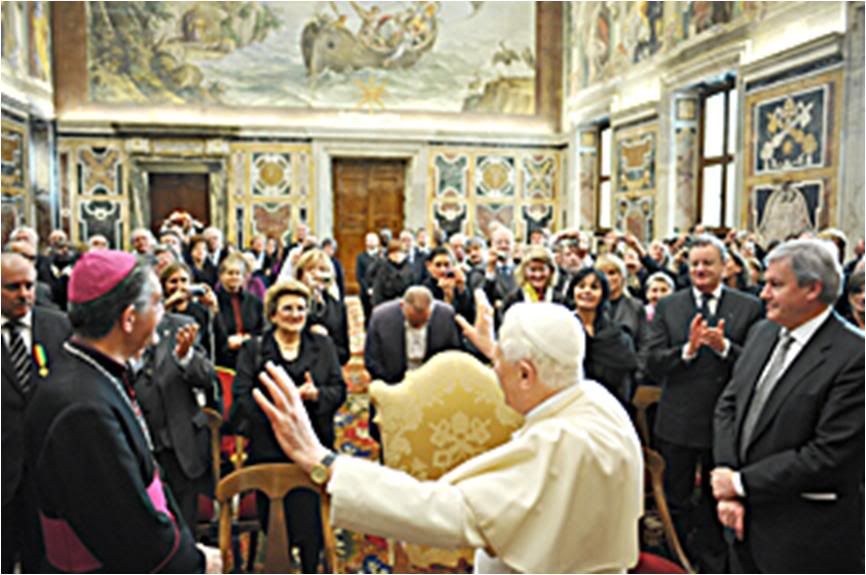 Here, translated, is what the Holy Father said in his remarks delivered in French, with a concluding paragraph in German:
Here, translated, is what the Holy Father said in his remarks delivered in French, with a concluding paragraph in German:
Dear brothers and sisters,
I welcome you all who have come to offer the Christmas tree which, with the Nativity scene, will adorn St. Peter's Square during the Christmas celebrations.
I address a special greeting to the Minister for the Economy of the Walloon region and to Mons. Aloys Jousten, Bishop of Liege, and thank them both for the kind words they addressed to me.
My cordial greetings also go to His Excellency Franck De Coninck, ambassador of Belgium to the Holy See, and to the local political authorities who travelled here.
I greet the choristers and the representatives of the Walloon agency for exports and foreign investments, who initiated the project.
My thanks go to all who gave their collaboration for this gift but who cannot be here today. And I thank those who insured the delicate transport of this imposing tree.
In the forest, trees grow close to each other and each contributes to make the forest a place of shade, sometimes dark. Among the multitude, this majestic fir that you offer us today is lit up and covered with sparkling decorations which are like wonderful fruits.
Giving up its sombre robe for this dazzling splendour, it is transfigured, it becomes the bearer of a light which is not its own but which bears witness to the true Light that comes to the world.
The fate of this tree is like that of the shepherds: watching in the shadows of the night, behold them illuminated by the message of the angels. The fate of this tree is also comparable to ours, we who are called to bear good fruit in order to show that the world has truly been visited and ransomed by the Lord.
Set up beside the creche, this tree manifests in its own way the presence of that great mystery that came to the simple and poor town of Bethlehem. To the residents of Rome, to all the pilgrims, to all who will be at St. Peter's Square through television images seen around the world, it proclaims the coming of the Son of God.
Through this tree, your land and the Christian communities of your region greet the Infant God, he who came to make everything new and to call on all creatures, from the most humble to the most exalted, to enter into the mystery of Redemption and be associated with it.
I pray that the people of your region may remain faithful to the light of the faith. Held high for a long time now by the men who ventured into the valleys and the forests of the Ardennes, the light of the Gospel has been shared among your people and carried forth by the numerous missionaries who left their native land to spread it to the ends of the world.
May the Church in Belgium, particularly the diocese of Liege, continue to be a land that germinates the seed of the Kingdom that Christ came to earth to sow.
May the Lord bless you, your region adn all Belgium!
In German, he said:
We are very happy that a Belgian tree shines forth to the world from St. Peter's Square. I wish for everyone that the light from this tree may bring joy to your hearts and that you may celebrate Christmas with greater inner joy. God bless you all. A blessed Christmas and a prosperous New Year!.
[Modificato da TERESA BENEDETTA 19/12/2009 10:29] |
| |
 19/12/2009 17:01 19/12/2009 17:01 |
|
| | | OFFLINE | | Post: 19.117
Post: 1.763 | Registrato il: 28/08/2005
Registrato il: 20/01/2009 | Administratore | Utente Veteran | |
|
 Saturday, December 19
Saturday, December 19
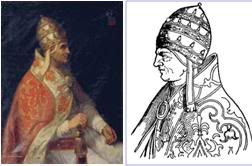 BLESSED URBAN V (France, 1310-1370)
BLESSED URBAN V (France, 1310-1370)
Benedictine monk and Pope (1360-1370)
A native of Provence, Guillaume Grimoard was abbot of a monastery in Marseilles when he was elected Pope,
in the century when the Popes reigned from Avignon not Rome (1305-1378). The ascendancy of the French
monarchy and its Frankish empire at the time also meant that French cardinals dominated. Urban V brought
his Benedictine culture to his papacy, setting the example for austere living, initiating reforms in the clergy
and the Church and liberally patronizing institutions of learning and culture. He tried hard to return the
Papacy to Rome but died shortly after returning from Rome where he was received triumphally by the people
and by the imperial court of Charles IV. Fighting among imperial and papal supporters in the papal states
of Italy continued, and the Papacy would not return to Rome till 1377, with Gregory XI, famously urged on
by Catherine of Siena and Bridget of Sweden. Urban's canonization was promised by Gregory XI as early
as 1375 but was stalled by the troubles of the time. His cultus was not officially declared until 1870.
OR today.
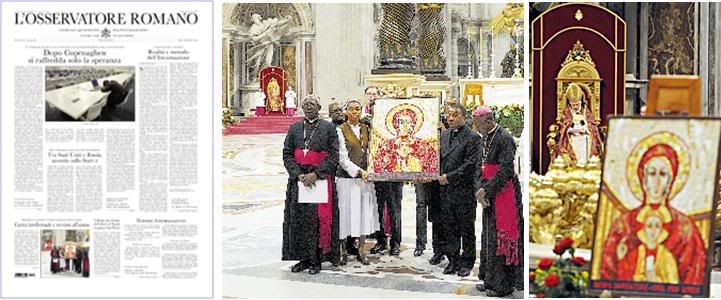 Papal stories on Page 1: the Pope's homily at Vespers with the university students of Rome on Thursday evening, and his audience for
Papal stories on Page 1: the Pope's homily at Vespers with the university students of Rome on Thursday evening, and his audience for
the Belgian pilgrims who came to formally present this year's Vatican Christmas tree. Other page 1 stories: A report on the failure
of the Copenhagen climate change conference to arrive at any binding agreement; an agreement between the USA and Russia towards
a new strategic arms reduction treaty; and an assessment by the Congregation for the Clergy halfway through the Year for Priests.
THE POPE'S DAY
The Holy Father met today with
- Mons. Angelo Amato, Prefect of the Congregation for the Causes of Saints
- Mons. Salvatore Fisichella, President of the Pontifical Academy for Life, and Rector Magnificus
of the Pontifical Lateran University
- Gianni Letta, Undersecretary to the Italian Prime Minister and the Cabinet
- Superiors and officials of the Congregation for the Causes of Saints, on the occasion of
the dicastery's 40th anniversary. Address in Italian.
- Representatives of the children's arm of Italian Catholic Action. Address in Italian.
And in the afternoon:
- Cardinal Giovanni Battista Re, Prefect of the Congregation for Bishops (weekly meeting)
The Holy Father today promulgated decrees recognizing miracles that will lead to the canonization
of five Blesseds, the beatification of five Venerables and a modern martyr, and the declaration of
heroic virtues for ten others, including Popes Pius XII and John Paul XIII.
The Vatican also issued a declaration 'to protect the figure of the Pope' against the unauthorized use
o the Pope's name and symbol or the adjective 'Pontifical' for any activities that have little or nothing
to do with the Catholic Church.
[Modificato da TERESA BENEDETTA 19/12/2009 18:41] |
| |
 19/12/2009 17:36 19/12/2009 17:36 |
|
| | | OFFLINE | | Post: 19.118
Post: 1.763 | Registrato il: 28/08/2005
Registrato il: 20/01/2009 | Administratore | Utente Veteran | |
|
 So the anticipatory Australian news reports had it right about soon-to- be-saints Mary McKillop, their own, and Canadian Brother Andre Bessette of Montreal who initiated the world's major shrine to St. Joseph, and the proclamation of heroic virtue for both Pius XII and John Paul II.
So the anticipatory Australian news reports had it right about soon-to- be-saints Mary McKillop, their own, and Canadian Brother Andre Bessette of Montreal who initiated the world's major shrine to St. Joseph, and the proclamation of heroic virtue for both Pius XII and John Paul II.
Benedict XVI has once again taken a most courageous move, finally allowing the process of beatification of Pius XII to move forward, and he will most certainly stir up much rancour anew among militant Jews who accuse the late Pope of having done nothing in the face of the Holocaust. Our Holy Father has his holiday 'penance' all cut out for him.
 From left, Mary McKillop, Andre Bessette, John Paul II, Pius XII, and Jerzy Popieluszko.
PROMULGATION OF DECREES
From left, Mary McKillop, Andre Bessette, John Paul II, Pius XII, and Jerzy Popieluszko.
PROMULGATION OF DECREES
BY THE CONGREGATION
FOR THE CAUSES OF SAINTS
Translated from

Today, December 19,2009, the Holy Father Benedict XVI received in private audience Mons. Angelo Amato, S.D.B., Prefect of the Congregation for the Causes of Saints, during which the Holy Father authorized the promulgation of decrees regarding:
- A miracle, attributed to the intercession of Blessed Stanislaus Sołtys, called Kazimierczyk, priest of the order of Canons Regular of the Lateran, born Sept. 27, 1433 in Kazimierz (Poland) where he died on May 3, 1489;
- A miracle, attributed to the intercession of Blessed Andre Bessette (secular name, Alfred), religious of the Congregation of the Holy Cross, born in Saint-Grégoire d'Iberville (Canada) on Aug. 9, 1845, and died in Montréal on Jan. 6, 1937;
- A miracle, attributed to the intercession of Blessed Mary of the Cross McKillop (secular name, Mary Helen), founder of the Congregation of the Sisters of St. Joseph of the Sacred Heart, born Jan. 15, 1842, in Fitzroy (Australia) and died Aug. 8, 1909 in Sydney;
- A miracle, attributed to the intercession of Blessed Giulia Salzano, Founder of the Congregation of the Catechist Sisters of the Sacred Heart of Jesus, born Oct. 12, 1846 in Santa Maria Capua Vetere (Italy) and died May 17, 1929, in Casoria;
- A miracle, attributed to the intercession of Blessed Battista da Varano (secular name, Camuilla), nun of the Order of St. Clare and founder of the Monastery of St. Clare in Camerino (Italy), born April 19, 1458, in Camerino, where she died on May 31, 1524;
- A miracle, attributed to the intercession of the Venerable Servant of God Josep Tous y Soler, priest of the Order of Capuchin Minor Friars and founder of the Congregation of the Capuchin Sisters of the Mother of the Divine Shepherd, born March 31, 1811, in Igualada (Spain), died Feb. 27, 1871, in Barcelona;
- A miracle, attributed to the intercession of the Venerable Servant of God Leopoldo de Alpandeire Sánchez Márquez (secular name, Francisco), lay member of the Capuchin order, born July 24, 1866 in Alpandeire (Spain), and died Feb. 9, 1956, in Granada.
- A miracle, attributed to the intercession of the Venerable Servant of God Emanuele Lozano Garrido, layman, born Aug. 9, 1920, in Linares (Spain). where he died on Nov. 3, 1971;
- A miracle, attributed to the intercession of the Venerable Servant of God Teresa Manganiello, Laywoman, of the Third Franciscan Order, born in Montefusco (Italy) on Jan. 1, 1849, where she died on Nov. 4, 1876;
- A miracle, attributed to the intercession of the Venerable Servant of God Chiara Badano, laywoman, born in Sassello (Italy) on Oct. 29, 1971, where she died on Oct. 7, 1990;
- The martyrdom of the Servant of God Jerzy Popiełuszko, diocesan priest, born Sept. 14, 1947, in Okopy Suchowola (Poland) and killed in hatred of the faith on Oct. 20, 1984, near Włocławek;
- The heroic virtues of Blessed Giacomo Illirico of Bitetto , lay member of the Franciscan Order; born in 1400 in Zara (Dalmatia), died around 1496 in Bitetto (Italy);
- The heroic virtues of the Servant of God Pius XII (Eugenio Pacelli), Supreme Pontiff, born in Rome on March 1, 1876, died in Castel Gandolfo on Oct. 11, 1958;
- The heroic virtues of the Servant of God John Paul II (Karol Wojtyła), Supreme Pontiff, born May 18, 1920, in Wadowice (Poland), died in Rome on April 2, 2005.
- The heroic virtues of the Servant of God Louis Brisson, priest and founder of the Oblates of St. Frnacis de Sales, born June 23, 1817, in Plancy (France) where he died on Feb. 2, 1908;
- The heroic virtues of the Servant of God Giuseppe Quadrio, prest of the Salesian Society of St. John Bosco, born Nov, 28, 1921, in Vervio (Italy), died in Turin on Oct, 23, 1963;
- The heroic virtues of the Servant of God Mary Ward (secular name, Joanne), founder of the Institute of the Sisters of the Blessed Virgin Mary, now the Congregation of Jesus, born in Mulwith (England) on Jan. 23, 1585, died im Hewarth on Jan. 30, 1645;
- The heroic virtues of the Servant of God Antonia Maria Verna, Founder of the Institute of Sister of Charity of the Immaculate Conception of Ivrea, born June 12, 1773, in Pasquaro di Rivarolo (Italy), where she died on Dec. 25, 1838;
- The heroic virtues of the Servant of God Maria Chiara Serafina di Gesù Farolfi (secular name, Francesca), founder of the Poor Clare Francscan Missionaries of the Holy Sacrament, born Oct. 7, 1853, in Tossignano (Italy), died June 19, 1917, in Badia di Bertinoro;
- The heroic virtues of the Servant of God Enrica Alfieri (secular name, Maria Angela), nun of the Congregation of the Susters of Charity of St. Jeanne Thouret, born Feb. 23, 1891, in Borgovercelli (Italy), died in Milan on Nov. 23, 1951;
- The heroic virtues of the Servant of God Giunio Tinarelli, layman, member of the Pia Unione Primaria Silenziosi Workers of the Cross, born in Terni (Italy) on May 27, 1912, where he died on Jan. 14, 1956.
Two Popes move closer to sainthood
By RACHEL DONADIO

December 19, 2009
ROME — Pope Benedict XVI moved two of his predecessors a step closer to sainthood on Saturday, confirming the “heroic virtues” of John Paul II and, in a surprise move, those of Pius XII, the Pope during World War II.
After John Paul’s death in April 2005, Benedict bypassed a traditional waiting period to put the much beloved Pope on a fast-track to sainthood. At John Paul’s funeral, crowds at Saint Peter’s Square chanted “santo subito,” or “sainthood now.”
Pius XII, however, has been a point of contention between the Vatican and some Jewish groups, who say he did not do enough to stop the Holocaust. They have called on the Vatican to open the sealed archives from Pius’s papacy, from 1939 to 1958, for examination by scholars.
On Saturday, the American Gathering of Holocaust Survivors and their Descendants called the decision on Pius “profoundly insensitive and thoughtless” and said it would cause “an inevitable blow” to interfaith relations.
“Pairing the announcement on Pius — who remained publicly silent during the Holocaust — with that on John Paul II, himself a victim of the Nazis, is a particularly disturbing and callous act,” the group added. ['Father, forgive them...' - I have resolved not to be provoked any longer by the formulaic and totally predictable Pavlov-dog reactions of militant Jews against Pius XII.]
Benedict has said that Pius worked “secretly and silently” to help save Jews. Although a Vatican committee confirmed his “heroic virtues” in 2007, Benedict had asked for time for reflection, which many saw as a diplomatic effort aimed at calming polemics.
On Saturday, the Pope confirmed the committee’s findings. Before the two Popes can become saints, another Vatican committee must determine that miracles have been attributed to them.
Benedict also confirmed the “heroic virtues” of six other potential saints and miracles for 11. He declared the Rev. Jerzy Popieluszko, the “Solidarity chaplain” murdered by the Polish secret service in 1984, a martyr.
Vatican insiders speculate that John Paul could be beatified as soon as next fall. [In time for the 32nd anniverary of his election as Pope in October 1978.]
[Modificato da TERESA BENEDETTA 19/12/2009 18:44] |
| |
|
|
|
|